

LUTHERAN WITNESS TO THE GOSPEL
Help communities around Lake Chad restore their land and livelihoods.

Sign your congregation up for the Friends of Creation Challenge and stand with communities facing increased drought and poor harvests. It takes just three easy steps:
• Commit four Sundays to learning and praying about the impacts of climate change on people around Lake Chad.
• Choose one thing from our list of suggested actions your church can take – or come up with your own!
Find free church resources, videos, Bible studies, children’s activities and more at clwr.org/foc-challenge. Use these resources to help your congregations learn about and act to care for creation.
• Pick a number of acres around Lake Chad that you’ll restore together by raising funds as a congregation.
In Chad and Cameroon, CLWR’s Nature Based Solutions program supports groups of female market gardeners like Ache Adeckoy (front), and (left to right) Soulouka Elise, Vanyang Celine and Pari Adèle. (Photo: CLWR/Quazi Alam)
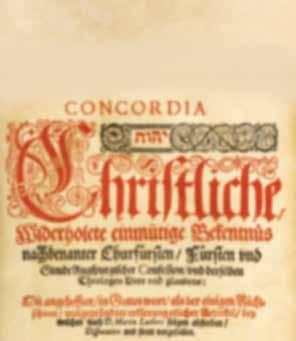

The Canadian Lutheran is the national publication of Lutheran Church–Canada, published in Winnipeg six times per year: January/ February, March/April, May/June, July/August, September/October, November/December under the auspices of the Board of Directors (Communications and Technology Committee).
ISSN #0383-4247
Member: Canadian Christian Communicators Association
Editor: Mathew Block
Designer: Alex Steinke
Advertising: Angela Honey
Subscriptions: $30/yr
Or Buy-One-Gift-One: $50/yr
Email: a.honey@lutheranchurch.ca
All material and advertising should be in the office of The Canadian Lutheran five weeks prior to publication date. Advertising rate card available upon request.
The Canadian Lutheran 3074 Portage Ave. Winnipeg, MB R3K 0Y2 Telephone: 204-895-3433 FAX: 204-897-4319
Email: editor@lutheranchurch.ca
Materials published in The Canadian Lutheran, with the exception of Letters to the Editor, news reports, and advertising, receive doctrinal review and approval before publication. Contents of supplements are the responsibility of the organization purchasing the space.
©2025 Lutheran Church–Canada. Reproduction of a single article or column for parish use does not require the permission of The Canadian Lutheran. Such reproductions, however, should credit The Canadian Lutheran as the source.
a publishing ministry of Good News Publishers. Used by permission. All rights










TABLE TALK
PREACHING CHRIST AND HIM CRUCIFIED
EDITOR | MATHEW BLOCK
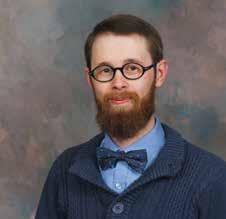
“For Jews demand signs and Greeks seek wisdom, but we preach Christ crucified, a stumbling block to Jews and folly to Gentiles, but to those who are called, both Jews and Greeks, Christ the power of God and the wisdom of God.” – 1 Corinthians 1:22-24
So writes St. Paul to the congregation in Corinth. And down through the ages, the Church—so long as it remains faithful to her Lord—must proclaim the same. “We preach Christ crucified.” Jesus Christ, the Son of God, entered this world to bear our sin and die in our place. And through His resurrection, He grants us new life and assures us of eternal life with Him in heaven. All of this comes to us as a gift, received by grace through faith and not by works (Ephesians 2:8-9)—a gift won for us by Jesus at the cross.
This is what it means to “preach Christ crucified.” This is the Gospel, the very heart of what we believe, teach, and confess as Christians. Whatever other ministry and work we might engage in as the Church, this must remain the centre from which all else flows. “For I decided to know nothing among you,” St. Paul writes to the Corinthians, “except Jesus Christ and Him crucified” (1 Corinthians 2:2).
In fact, the entire Bible—and not just the New Testament—was written to proclaim Christ. Referring to the Scriptures of the Old Testament, Jesus said: “It is they that bear witness about Me” (John 5:39). Likewise, the resurrected Christ explained to the two disciples on the road to Emmaus how “all the Scriptures”—from Moses through the Prophets—testify to Him (Luke 24:27). And if Jesus is the central testimony of all Scripture, why would Christians today ever proclaim anything else but Him crucified?
But of course, not all people accept the message of the Gospel. As we read at the beginning of this article, the Gospel was opposed in St. Paul’s time by many Greeks who considered the message of the cross mere foolishness. Likewise, many Jews opposed the Gospel, demanding miraculous signs on their own terms—as if a greater sign than the death and resurrection of the Son of God could be offered!
Nor was resistance to the Gospel restricted to those outside the Church. Even among those who claimed to follow Jesus there was confusion about the Gospel. Surely there must be more to it, they said, than Jesus dying to save us from our sins! Surely we must need to keep certain rules on our part, do certain works, in order to
truly be saved! They preached, in other words, a different “gospel,” one based on works-righteousness—“not that there is another” Gospel,” St. Paul is clear, “but there are some who trouble you and want to distort the Gospel of Christ” (Galatians 1:7).
That temptation to distort the Gospel of Christ has continued down through the centuries. In Martin Luther’s day, for example, church authorities taught that our good works are necessary to merit eternal life—a teaching which obscured the good news that we are justified by grace alone through faith alone thanks to Christ’s death and resurrection. It is always necessary, therefore, for the Church to continually ask itself: are we preaching Christ and Him crucified? Are we centering our faith and hope in Jesus, who is alone the “one thing… necessary” (Luke 10:42)?
The Lutheran tradition was born out of a renewed focus on the Gospel, and through the grace of God, the Gospel has remained the heart of confessional Lutheran witness in Word and Sacrament to this very day. We desire to know, we desire to preach nothing but Christ and Him crucified. In this issue, we reflect on that Lutheran witness to the Gospel. Robin Dalloo reflects on how Lutheran teaching on justification drew him to the Lutheran Church (page 6). We hear also from Luther himself, with an article on the Gospel drawn from his House Postils (page 9). Rev. Dr. James Kellerman, meanwhile, notes the 500th anniversary of Luther’s book The Bondage of the Will, explaining the work’s significance for our understanding of God’s grace (page 12). And LCC President Timothy Teuscher discusses the continuing significance of the 95 Theses for us as we proclaim the Gospel of Jesus Christ today (page 42).
Lord Jesus Christ, You have given the Church the privilege to share the Gospel with a broken and hostile world. Send Your Holy Spirit to prepare and encourage us for this work. Raise up for us faithful ministers to proclaim the Gospel in Word and Sacrament. And kindle in all of us a heart to share the good news of Christ with friends, family, and neighbours—inviting them to “come and see” Jesus and Him crucified. Amen.
Younger and workshop, St. Mary’s Church, Wittenberg.
Reformation Altarpiece, Lucas
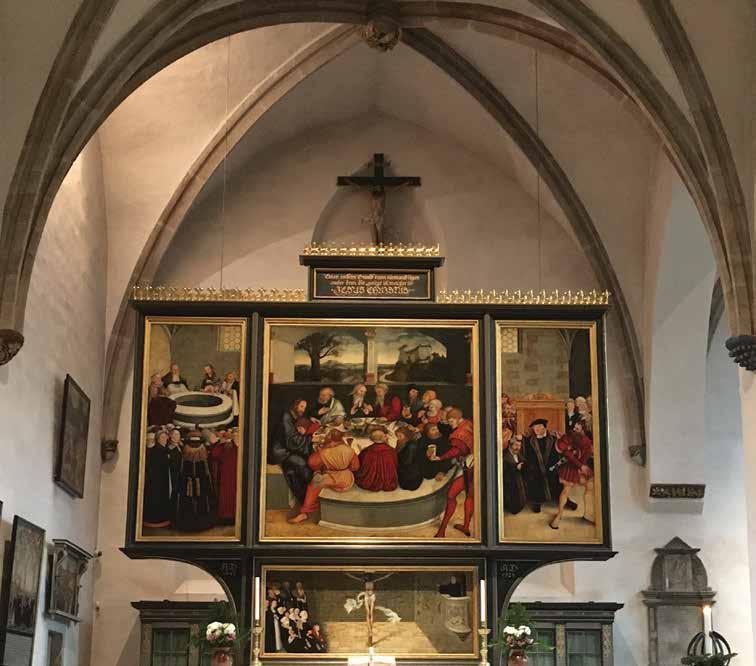
The Road to Catholicism and Orthodoxy Lutheranism
by Robin Dalloo
One of the growing trends in North American church life today is the movement of young people away from Evangelical and Protestant churches for Roman Catholicism or Orthodoxy—or at least that’s a claim often made online. Believing that these two churches
are the “original” versions of Christianity, such converts forget the historical reasons for the Reformation and the Gospel truth that the Reformers fought for the freedom to preach. Today, many people see the Reformation and its 500 years of history as mere innovation and as a deviation from the true church. The Reformed theologian Kevin Vanhoozer puts the question many are asking in this way: “Is the Reformation something we should recover, or something we should recover from?”
When asked what draws young people to Catholicism or Orthodoxy, most converts do not point to Scripture. Instead, they point to other things: the beautiful architecture of cathedrals or Dante’s poetry, for example, or the mystics and iconography. These things can indeed be beautiful— but making them the basis for conversion demonstrates a believer’s theology of glory. By contrast, Martin Luther preached a theology of the cross that emphasized the sinner coming to know the grace of God in the crucified Jesus.
The Protestant Reformation was not an innovation but rather a movement within the church catholic. As Stanley Hauerwas has said: “Protestantism is a reform movement within the church catholic to make the church catholic truly catholic.”
I was raised in a non-denominational church and began studying theology at the age of 18. Many of my friends and I who were studying philosophy and theology eventually came to the conclusion that there were too many philosophical contradictions in Protestantism (at least as we understood it). We thought that Orthodoxy or Catholicism were the true expressions of historical Christianity. At age 24, as a result, I was received into the Roman Catholic Church. Many of my friends also joined Catholicism around the same time.
I embraced a Catholic prayer and devotional life for many years; but as someone who was not raised in the tradition, I found I had to reckon with the things I was now doing and saying. For example, I began praying for souls in Purgatory—but my conscience was not at peace. I felt I had gone too far. I remembered the Reformation’s rallying cry against the practice of works righteousness and unbiblical teachings like Purgatory.
In time, I became acquainted with some Lutheran pastors and lay theologians. I returned to belief in the importance of justification by faith. Eventually I made a profession of faith and was received into Lutheran Church–Canada in 2019.
It shouldn’t be surprising then to learn that today I no longer believe that the Reformation is something we should repent of or seek to reverse. As the saying goes, “semper reformanda, secundum verbum Dei”—the church is “always reforming, under the Word of God.”
Many Roman Catholic apologists and their followers in conversion culture view the Reformation as something that “split the church.” They cite overblown (and
One of the growing trends in North American church life today is the movement of young people away from Evangelical and Protestant churches for Roman Catholicism or Orthodoxy—or at least that’s a claim often made online. “
misunderstood) statistics on how many Protestant denominations supposedly have sprung up in the name of sola Scriptura (“Scripture alone”). To have true unity in the Church, they argue, we must all be under the Pope. For this, they cite Matthew 16, which they interpret as Jesus making Peter the first Pope. They also cite John 6, and connect apostolic succession with a valid Eucharist. According to them, only churches in communion with the Pope offer such a valid Eucharist.
What they fail to see in these texts is that Scripture is more open in its catholicity. Does not our Lord say that wherever two or three are gathered in His name, He is there (Matthew 18:20)? Limiting the Church to only those bodies in communion with the Pope then is to reduce the church catholic—the church universal (which is what “catholic” means)—to mere institutional catholicity. It fails to leave room for the Holy Spirit’s work in the preaching of the Word of God outside Roman Catholic walls.
Putting aside the questions of apostolic succession and the Pope, the main issue in dispute between Roman Catholics and Protestants remains justification. This was the major issue during the Reformation, and it is still
As for those other things which young people sometimes point to as a reason to convert—the beauty of Catholic liturgy, for example—we should remind them the Lutheran Church also has a deep and rich liturgy following the pattern of the church historic.
the centre of disagreement today. In the 16th century, the Catholic Church countered the teaching of Martin Luther and the other Reformers, arguing at the Council of Trent that we are justified by faith and works together. They indeed taught that we are justified through Christ and that this grace is infused into the believer’s soul. But they said that this grace is given as an aid to virtue. Ultimately, they argued, believers will be judged on the measure of grace and virtue in their souls. Baptism introduces us to divine life, and more of this life is poured into the soul through the Sacraments; but ultimately, the believer will be judged on the basis of their own virtue.
By contrast, the Lutheran position is that we are justified through an “alien righteousness”—which is to say, not through our own righteousness but through a righteousness from outside of us: through Christ’s righteousness. The cross and resurrection are salvific; they are not just an outpouring of divine life but the very instruments of our salvation. The work that Christ did on the cross is imputed to us. He receives our sin, and we receive His alien righteousness. It comes to us extra nos—from outside of ourselves. It isn’t our works that save us; it’s Jesus. Those considering leaving their church home for another should reflect long and hard on the issue of justification.
As for those other things which young people sometimes point to as a reason to convert—the beauty of Catholic liturgy, for example—we should remind them
the Lutheran Church also has a deep and rich liturgy following the pattern of the church historic. We sing beautiful chorales, many churches still sing polyphony, and we use musical settings composed by master composers like Johann Sebastian Bach. It is certainly true that some Protestant church bodies do not have a rich liturgical heritage; but there is a wealth of beauty and tradition in the Lutheran tradition.
At the same time, our tradition is rooted in Scripture, and our devotional practices flow from a theology inspired by Scripture. Some converts to Catholicism and Orthodoxy are attracted to the idea of mysticism—to the suggestion they might experience supernatural revelations from God. But God promises no such experiences in His Word. If we seek mystical experiences for their own sake, we can fall into the danger of treating our own thoughts and imaginings as more important or authoritative than God’s Word.
We must remain rooted in Scripture. The Reformers held fast to this teaching, and their Scripture-based understanding of the Gospel—that we are justified by faith alone in Christ—remains relevant today and always. We must not depart from this Gospel that we have received.
As children of the Reformation, we should reclaim our identity as people who seek the Truth and are not afraid of controversy. Theological reflection is not new to Lutherans, and we rightly delight in our Lutheran Confessions. As a result, we should welcome modern conversion culture—as Evangelicals and other Protestants look for a deeper connection to the Church historic—as a new opportunity to preach the Gospel. Our preaching and worship should reflect the joy of salvation that comes not from our own works, no matter how beautiful or intellectually appealing they may be, but instead from the crucified Saviour, who welcomes sinners. Grace comes from outside of ourselves through Christ, not through our institutional affiliation with a specific church body. The preaching of God’s Word creates the community of faith. Christ Himself calls His flock.
“Christ alone our souls will feed; He is our meat and drink indeed; Faith lives upon no other.” So writes Martin Luther (LSB 458:7). Our communion is not merely with an earthly institution, but instead with Christ, with His Father, and with the Holy Spirit. Where this truth is taught clearly, the true Church is truly present.
Robin
Dalloo is a writer with a Master of Divinity degree living in Winnipeg.
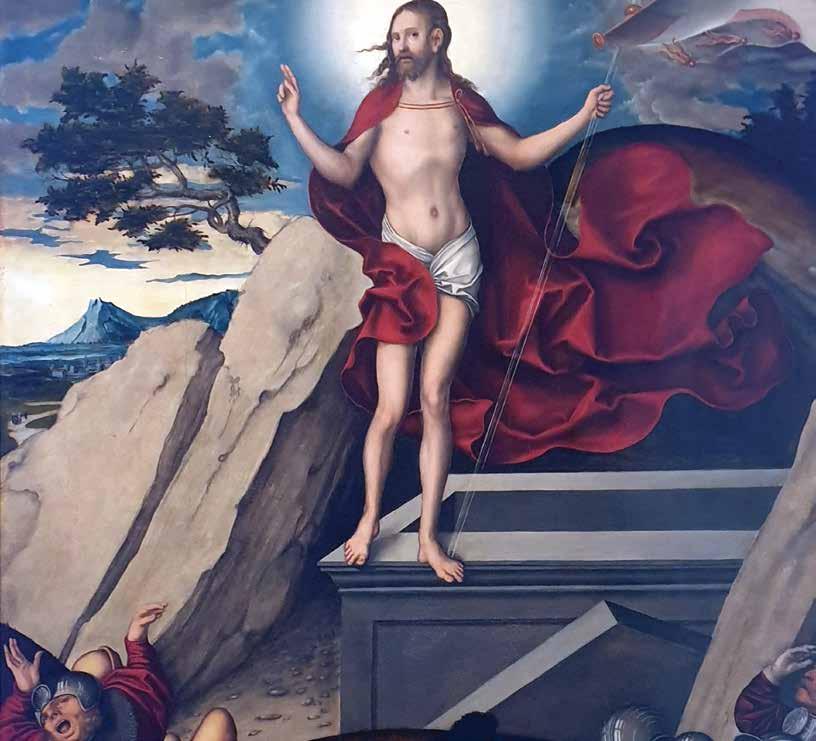
Christ’s Death and Resurrection for Us
by Martin Luther
If we desire to understand the benefits of the resurrection of Christ, we must keep in view two distinct pictures. The one is sombre, full of distress, misery, and woes; it is the scene of blood presented to us on Good Friday—Christ crucified between murderers and dying with excruciating pain. This scene we must reflect
upon with much earnestness to realize that it all happened on account of our sins: yes, that Christ as the true High Priest sacrificed Himself for us and paid our debts with His death. We all ought to know that our sins thus wounded and tormented Christ, and that His sufferings were caused alone by our iniquities. Therefore, as often
Lucas Cranach the Elder, The Resurrection (1537), from the “Cycle of Passion,” Jagdschloss Grunewald, Berlin.
Upon Him we now find our burden. Let us leave it there, for there is no one else to be found who could better relieve us of it.
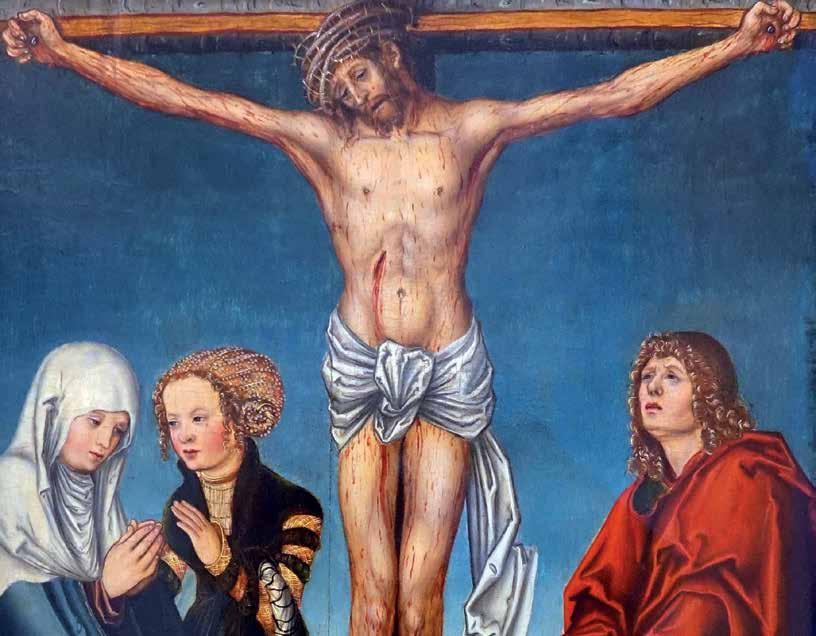
as we remember or view this sorrowful, bloody scene, we ought to bear in mind that we have before us our sins and the terrible wrath of God against them—a wrath so dire that no creature could endure it, that all atonement became impossible except the one made by the sacrifice and death of the Son of God.
If this awful scene were the only one presented to our sight, and if it remained unchanged, it would be too terrible and painful. But this picture of sorrow is changed, and in our Creed we join closely together these two statements: Christ “was crucified, died, and was buried, and “He descended into hell;” but on “the third day He rose again from the dead.” Yes, before three days had gone by, our Lord and Saviour presents to us another picture, beautiful, full of life, lovely, and cheerful, in order that we might have the sure comfort that not only our sins were annihilated in the death of Christ, but that by His
resurrection a new eternal righteousness and life was obtained, as St. Paul says: Christ “was delivered up for our trespasses and raised for our justification” (Romans 4:25). And in 1 Corinthians: “If Christ has not been raised, then our preaching is vain and your faith is vain… your faith is futile and you are still in your sins. Then those also who have fallen asleep in Christ have perished. If in Christ we have hope in this life only, we are of all people most to be pitied” (15:14, 17-19).
As in the former scene we saw the burden of our sin upon Him and bringing Him to the cross, so in this other scene of the resurrection we witness no longer sin, pain, and sorrow, but only righteousness, joy, and happiness. It is the victory of life over death—a life everlasting, with which this temporal existence on earth cannot be compared. About this we have reason to rejoice. Simply to view the former scene would be terrible; but when
The Crucifixion, Lucas Cranach the Elder (~1515).
we view it in connection with the glad event of the resurrection, and when we bear in mind why our Lord suffered thus, we will gain from such contemplation much benefit and comfort. It will become clear to us how inexpressibly great the love of God toward us poor sinners was, as He had compassion on our misery, even to such an amazing extent that He did not spare His beloved and only Child, but gave Him up for us, to bear upon the cross and in death the burden of our transgressions, which were too heavy for us and would have crushed us to the earth. This load was taken from us and placed by God Himself upon His Son, who, as God from eternity, could alone bear the heavy weight of sin. Upon Him we now find our burden. Let us leave it there, for there is no one else to be found who could better relieve us of it.
The other scene presents to us Christ no longer in woe and misery, weighed down with the great mass of our sins, which God has laid upon Him, but beautiful, glorious, and rejoicing; for all the sins have disappeared from Him. From this we have a right to conclude: If our sins, on account of the sufferings of Christ, lie no longer upon us, but are taken from our shoulders by God Himself and placed upon His Son, and if on Easter, after the resurrection, they are no more to be seen, where then are they? Micah truly says that “all our sins” are cast “into the depths of the sea” (7:19); and no devil nor anybody else shall find them again.
If we desire to be true Christians, it is necessary for us firmly to establish in our hearts through faith this belief: that Christ, who bore our sins upon the cross and died in payment for them, arose again from the dead for our justification. The more firmly we believe this, the more will our hearts rejoice and be comforted. For it is impossible not to be glad when we see Christ alive, a pure and beautiful being, who was before, on account of our sins, wretched and pitiable in death and in the grave. We are now convinced that our transgressions are removed and forever put away.
In the former scene of suffering and death we witnessed our sin, our sentence of condemnation and death resting heavily upon Christ, making Him a distressed, pitiable Man; now, on Easter, we have the other scene no longer mixed with sin. No curse, no frown, no death is visible; it is all life, mercy, happiness, and righteousness in Christ. This picture can and should cheer our hearts. We should regard it with no other feeling but that today God brings us also to life with Christ. We should firmly believe that as we see no sin nor death nor condemnation in Christ, so God will also, for Christ’s sake, count us free from these if we faithfully rely upon His Son and depend upon His resurrection. Such a blessing we derive from faith.
The day will come when faith shall be lost in sight. In the end, our bodies will also be perfected, so that neither sin nor death can have power over them. For
the present we are as weak and sinful as other people; only we strive to shun open and flagrant sins. It is true, Christians may also, now and then, be guilty of these, but they remain not in them; they flee them again through earnest repentance, and obtain through faith forgiveness of all their sins. Therefore we must daily pray: “Forgive us our trespasses.” On the other hand, it may be that heathens and unbelievers, in their outward walk and life, appear before the world just as good, yes, even better than the true children of God. To know and judge a Christian correctly, it is necessary to make his faith the criterion. As to our flesh and blood we are sinners, must die, and suffer many evils upon earth—perhaps even more than others who have no faith, since Christians feel the burden of their sins and are troubled by them, while others can live in full security, undisturbed by their guilt. How then can Christians claim to be holy and free from sin? By believing that in Christ, who died for their sins and arose again from the dead, they have forgiveness, upon which they rely and which they earnestly seek in faith.
These two facts then belong together: through faith in Christ, we are pure and holy; on account of the old Adam within us, we are impure and sinners. This impurity we remember when we pray: “Our Father… forgive us our trespasses,” and are comforted in the faith that God, for Christ’s sake and in the power of His resurrection, hears us and forgives us, and grants us eternal life. Thus we are holy in Christ through faith, even if we are sinners; for it matters not how much is yet lacking in us: Christ our Lord and Head arose from the dead. He has conquered sin and death, and we, through faith in Him, are also freed from their power.
Let us therefore earnestly view and study this joyful, lovely, and blessed Easter scene. It is a picture without sin and death. If sin troubles us, if our conscience accuses us of evil deeds and faithlessness, let us remember and exclaim: “It is true, we are sinners, nor can we deny the weakness of our faith; but we comfort ourselves with the knowledge that Jesus Christ has taken our iniquities upon Himself and carried them. And by His resurrection, sin and punishment threaten us no more.”
May we learn utterly to disregard our own holiness, and to keep before our eyes only this Easter scene: Christ arisen from the dead, the Conqueror over death, sin, and hell. If we thus look to Christ alone, and not to ourselves, it will be well for us. May our Lord Jesus Christ grant us this in mercy. Amen.
This article is condensed from Martin Luther’s “First Easter Sermon” in the House Postils. It is lightly adapted from E. Schmid’s translation in the 1884 edition by Matthias Loy.
Luther’s BONDAGE OF THE WILL Bound to Sin?
by James Kellerman
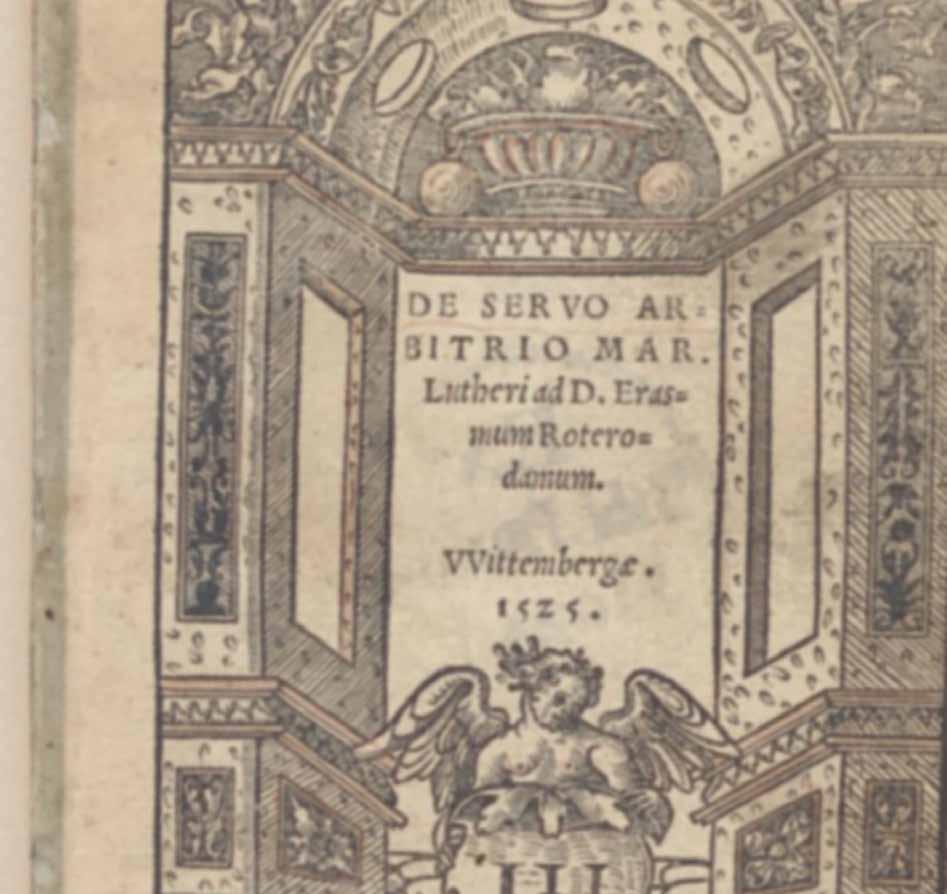
If people know of one writing by Martin Luther, it is his 95 Theses. Surprisingly, though, Luther never named it one of his best writings. Instead, that honour belongs to The Bondage of the Will, which is celebrating its 500th anniversary this December.
It was written in response to the Diatribe of Desiderius Erasmus, a brilliant philologist and Renaissance humanist who sought to reform the Roman Catholic Church while
staying within its fold. In the Diatribe, he faulted Luther for making bold assertions on difficult topics such as the freedom of the will. Erasmus argued that Christians should leave doctrinal matters to the bishops or the consensus of the church fathers and instead just focus on improving morality. His advice dovetailed with his own belief that Christianity was largely about inculcating good behaviour and that everybody had the power to make the right choice.

Erasmus did not realise that he had stumbled into a major controversy with Luther. Erasmus had picked a quarrel over what he saw as a minor issue to prove his loyalty to Rome so that Rome would leave him alone. But Luther thought that Erasmus had gone for his jugular. If humans have the innate ability to choose God and adopt good behaviour, then there is no need for Christ to save us or for the Holy Spirit to bring us to faith. God would justify us based on our works rather than on His grace.
The Bondage of the Will is the usual English title of the book, but Bound Choice would be a more accurate translation. The question was not whether the human will might be tainted by less than noble desires, but whether human beings before their conversion retained the power to choose God freely and make good moral choices despite those human weaknesses. Erasmus said yes, and Luther said no.
Their answers had implications for the rest of their theology. Because Erasmus thought that Christianity was about fostering morality, he thought the average Christian did not need to delve deeply into theology but could rely on the church’s wisdom. Even theologians should avoid clear assertions because the Bible was often obscure, and expounding its theological topics did not help anyone.


In contrast, Luther insisted that Christians live by making assertions—assertions based on the Scriptures. The Scriptures themselves are clear, for God has given them to us so that we may know Him. If they are obscure or if people misuse their content, it is because the unconverted human heart naturally rejects their clear truth. Everything in the Bible, including difficult topics such as predestination and bound choice, is to be taught, for the Scriptures are God’s gift to us.
Erasmus put the burden of salvation upon our ability to choose God freely. Thus, he minimised God’s gift of revelation as obscure and pointless except insofar as it might lead to our moral improvement. But Luther correctly understood that fallen humanity in its unconverted state cannot choose God or bring itself to believe in Him. Instead, God has to take the initiative at every step. He has to impart His revelation, and He has to change our will from loving sin to loving Him. Once He does so,
our will delights in God and His gifts, and we show our appreciation for His gifts by clinging to the faith He has given us and by asserting whatever the Scriptures teach. By doing so, we proclaim that we are saved by God’s grace alone. And we begin to abound in good works, now that He has renewed our mind.
But if fallen humanity in its natural state is bound to choose evil, aren’t we saying that human beings are like rocks that have no choice in what happens to them? Aren’t we actually discouraging people from doing the good they otherwise could have done? And isn’t this doubly true if we insist, as Luther did, that God directs all things and that nothing happens apart from His will? Doesn’t this make God the author of evil? These were objections Erasmus had raised.
God freely chose us because we could not choose Him.
Luther replied that fallen human beings do not sin against their will. Their choice is bound in the sense that unconverted human beings cannot authentically choose to do good works out of love for God as Christians can do in some measure. As Luther explained elsewhere, unbelievers may do some astounding works, but these works do not please God, for they are not done out of faith in God and love for Him. Inevitably, unbelievers sin, whether they do blatantly evil deeds or do outwardly good works but then adopt
If humans have the innate ability to choose God and adopt good behaviour, then there is no need for Christ to save us or for the Holy Spirit to bring us to faith.
a self-righteousness that trusts in their own goodness. Either way, people sin willingly. For example, Judas was not forced against his will to betray Jesus, but he freely chose to do so. Consequently, Christ could predict that Judas would betray Him and yet still fault Judas for making that wrong choice.
Luther compared God to a horseman riding a lame horse or a carpenter using a defective axe. No matter how skilled the horseman is, the horse will have a crooked gait. No matter how skilled the carpenter, the axe will mar the wood. Fallen human beings similarly distort the good action of God. We live, move, and have our being in Him (Acts 17:28), and thus every movement of ours must flow from His providence—but we alone are responsible for the defects caused by our sins.
As Luther understood but Erasmus did not, we are not born morally neutral. Therefore, God is not starting from scratch when He deals with us. We begin as fallen human beings, and we will continue to be such unless He does something about it. Thus, He is not responsible for making us evil—that is the fault of the devil and our ancestor, Adam. Instead, God finds us as the devil and our fallen human nature has rendered us: sinners whose will is not open to Him.
Why then, Erasmus asked, does God command us to do good and avoid evil if we are bound to sin? Why does He offer to reward good behaviour and punish evil? Luther replied that these impossible commands teach us how powerless we are without God. It is the only way He could get through to our stubborn hearts. Moreover, God rightly rewards good and punishes evil because we are never compelled to sin against our will. Our will before conversion may always choose to sin, but it does so willingly, and so our punishment is just.
All of this may be true, you may say, but does it have any practical application for us? Yes, for the Scriptures never make idle points. First, this doctrine shows us where we stand. How can fallen human beings vow to do good
works without first sizing up whether they have the ability to do so? More than that, it leads us to despair of ourselves, which opens us up to faith in Christ as our Saviour. As Luther noted, this doctrine at first led him to despair, but the more he despaired, the nearer he was to grace.
Furthermore, this doctrine points us away from ourselves to God and His absolute governance. It lets God be God. And that is a good thing because the Scriptures reveal that God is just and merciful. Even if at times He appears to be unjust, letting the wicked flourish and the righteous suffer, the God of the Scriptures reveals the truth—a truth that we will see more clearly with our eyes on the Last Day. Until then, we trust that God does not lie and will not disappoint. We stop relying on our own fickle choices, and we rejoice that God has chosen to redeem us through the life and work of His Son, our Lord Jesus Christ.
It is no wonder, then, that Luther called this treatise one of his best writings. But as any author knows, no work is beyond tweaking. One problem Luther recognised was his argument from “necessity.” He had argued that human beings cannot control their own will because God controls everything that happens in the world. Everything happens by necessity, as determined by God. Later, in his lectures on Genesis, Luther backed away from such language to avoid the impression that he was teaching that humans were coerced by God to sin. But his overall point remained: fallen human beings before their conversion can only choose sin, which they do willingly. Christians do genuinely good works (mixed in with their sins), but the fact that we can do so is because God has changed our will so that we can delight in Him and in His will.
Despite the passage of time, Erasmus’s idea remains popular, among Catholics and Protestants alike: human beings have free choice to obtain their own salvation through their good works. Thus, we would do well to read Luther’s Bondage of the Will and learn from him that God freely chose us because we could not choose Him.
Rev. Dr. James Kellerman is Associate Professor of Theology at Concordia Lutheran Theological Seminary (St. Catharines, Ontario).
Photos featured in this article:
Martin Luther as an Augustinian Monk, Lucas Cranach the Elder (German, 1472-1553), 1520. Engraving. Digital image: The Metropolitan Museum of Art, Open Access. Accession no. 20.64.21. Public domain.
Title page of De Servo Arbitrio (Martin Luther, 1525/1526). Digital image: Wikimedia Commons. Public domain.
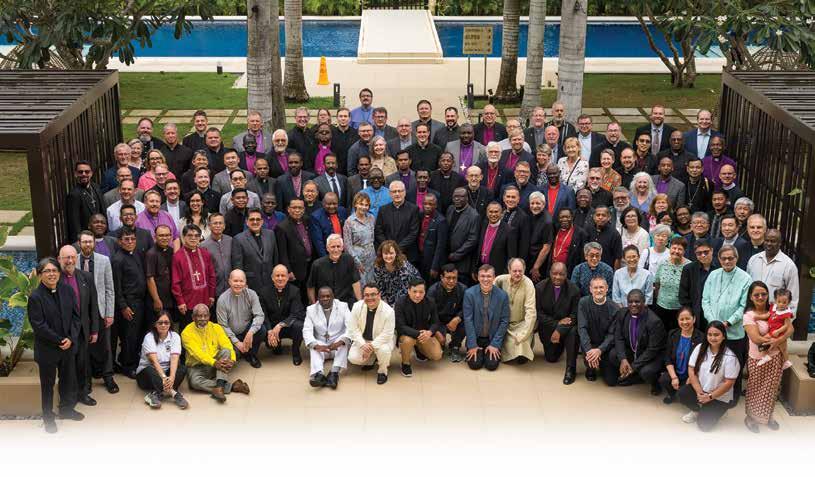
The ILC’s 2025 World Conference in Brief
PHILIPPINES – The International Lutheran Council (ILC) held its 28th (13 th ) triennial World Conference took place September 14-19, 2025, in Panglao, Bohol, Philippines. In total, more than 130 people representing more than 60 different church bodies and 55 nations participated in the event.
Teuscher was also reelected as North America representative ( see photo caption below for other officers elected or reelected).
The conference also saw six observer member churches received into full membership in the ILC: the Confessional Lutheran Church –
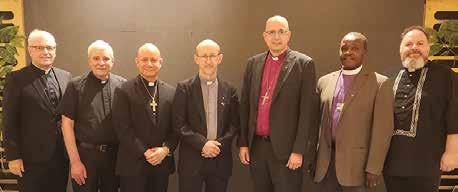
ILC General Secretary Klaus Detlev Schulz (left) and the new board of directors: LCC President Timothy Teuscher (North America), SLM President Omar Garza Martínez (Secretary), IELP President Alceu Alton Figur (Latin America), ELMDF Bishop Juhana Pohjola (Chairman), LCU Bishop Charles Bameka (Africa), and LM-A President Matt Anker. LELB Archbishop Rinalds Grants (Europe) was unable to attend in person.
During the conference, Bishop Juhana Pohjola of the Evangelical Lutheran Mission Diocese of Finland (ELMDF) was reelected as chairman of the ILC. LCC President Timothy
Malawi Synod (CLCMS); Lutheran Mission – Australia (LM-A); the Evangelical Lutheran Church of Kazakhstan (ELCK); the Istanbul Lutheran Church (ILK)/Evangelical
Lutheran Church of Bulgaria (ELCB); the Evangelical Lutheran Church of Haiti (ELCH); and the Malagasy Lutheran Church (FLM).
UNITY IN CHRIST
The theme for the ILC’s 2025 World Conference was “Unity in Christ: Confession and Cooperation in a Fragmented World.” The keynote speaker for the event was Rev. Dr. Thomas M. Winger of St. Catharines, Ontario, Canada, who gave a three-part presentation entitled “The Spiritual Temple,” focused on Ephesians 2:11-22.
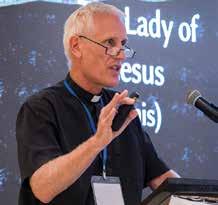
cont’d on next page
Rev. Dr. Thomas M. Winger.
The conference also featured several sessions with a regional focus, including an Asia Regional Focus on Shamanism and Syncretism; a Latin America Focus on migration; and an African Regional Focus on the charismatic movement. The ILC’s General Secretary, Rev. Dr. Klaus Detlev Schulz, gave a presentation entitled “Affirming Constants in an Everchanging World,” and the conference also heard presentations on history, Bible translation, and Christian publishing.
On the final day of the ILC’s world conference, participants adopted two statements: one on the Nicene Creed and the other on unity in Christ. The first of these—“An Affirmation of the Nicene Creed”—was adopted
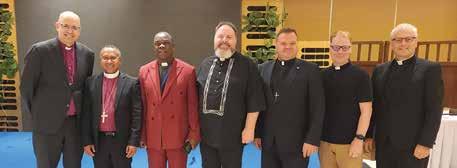
Representatives of church bodies received as full members during the ILC’s 2025 World Conference. Pictured are ILC Chairman Juhana Pohjola, FLM Bishop Denis Rakotozafy, CLCMS President Davis Robert Wowa, LM-A President Matt Anker, ELCK Bishop Alexander Burtsev, ILK/ELCB representative Rev. Mikko Tiira, and ILC General Secretary Klaus Detlev Schulz. A representative from Haiti was unable to be present.
in light of this year’s anniversary commemorations of the Council of Nicaea. The second statement adopted—“Unity in Christ and His
Gospel”—reflects on the theme of this year’s ILC World Conference.
ILC News
Rev. Dr. Robert Bugbee, long-serving ILC board member, steps down
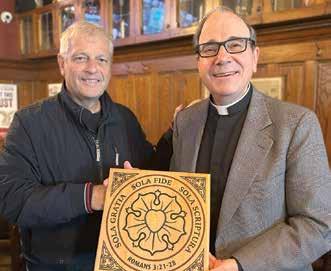
CANADA – Rev. Dr. Robert Bugbee has stepped down as a member of the board of directors of the International Lutheran Council (ILC). Dr. Bugbee informed the board of his plans to do so in early 2025. He intends to continue serving in pastoral ministry in Windsor, Ontario, Canada.
“Dr. Bugbee’s warm personality, long pastoral experience, and deep understanding of the life of the Church and our Lutheran Confessions have
been an invaluable aid in the building of the International Lutheran Council over the years,” said ILC Chairman Juhana Pohjola.
“We thank the triune God for Robert and for his long service, and we pray he will continue to find joy and strength in his pastoral ministry in the
service of Christ’s Gospel.”
In announcing his decision to step down from leadership in the ILC, Dr. Bugbee thanked the board for the opportunity to serve with them over the years and assured them of his continued prayers. “I thank you all sincerely for your many kindnesses toward me,” he said, “and commend the vital work of our Council to the Lord.”
At the time of his resignation, Dr. Bugbee was the longest-serving
member on the board. Dr. Bugbee first joined the executive leadership of the ILC following his 2008 election as President of Lutheran Church–Canada (LCC). He became Vice-Chairman of the ILC in 2010, and continued in that role until 2017 when he stepped down as President of LCC in order to return to parish ministry.
At that time, Past President Bugbee notes, he expected it also to be the end of his service with the ILC. But the board requested Dr. Bugbee continue serving on the board as a member at large. He also continued to serve the ILC as a member of the board’s Executive Leadership Group.
Dr. Bugbee’s service with the ILC’s board of directors officially came to a conclusion on June 1, 2025. In gratitude for his many years of leadership in the International Lutheran Council, the board presented Dr. Bugbee with a plaque on August 29, 2025.
ILC News
Caring for those who care for us: LCC launches new wellness and mental health initiative

WINNIPEG – Pastors, deacons, and church workers give their lives in service to others. Now, Lutheran Church–Canada (LCC) is taking new steps to care for them.
In response to growing concerns about the mental, emotional, physical, and spiritual well-being of church workers, LCC is launching a new initiative focused on wellness and mental health support across the Synod.
At the heart of this effort is the newly developed Guidelines for Caring for Called Workers, a practical and biblically grounded resource designed to help congregations and employers support their Called Workers. The guidelines encourage congregations to foster healthy ministry environments, establish supportive practices, and build a culture of care and respect for those who serve.
Why This Matters
Serving in ministry is both a calling and a challenge. Many of LCC’s pastors, deacons, and other Called Workers serve alone, often far from the support of colleagues. They face unique pressures: emotional strain, long hours, pastoral isolation, rising expectations, and increasingly complex congregational structures and dynamics. Over time, these challenges can lead to stress, burnout, and even departure from ministry.
Recognizing this reality, the Board of the Worker Benefit Services initiated the development of clear and adaptable guidelines. The process began with a survey in October 2024 that gathered feedback on lifestyle, mental health resources,
and work-life balance. The findings were reinforced in the February 2025 Manulife Wellness Survey and refined through conversations with pastors, Regional Pastors, lay leaders, and LCC’s Board of Directors.
“These guidelines are not just about policy—they’re about the people God has called into ministry,” said LCC President Timothy Teuscher. “They are a way to show care, grounded in Scripture, for those who serve among us with faithfulness and sacrifice.”
The result is eleven practical principles addressing key areas such as supportive leadership structures, healthy work-life boundaries, recognition of worker contributions, professional development, self-care, and family support.
“These guidelines are not just about policy—they’re about the people God has called into ministry,” said LCC President Timothy Teuscher. “They are a way to show care, grounded in Scripture, for those who serve among us with faithfulness and sacrifice.”
A Wellness Coordinator for the Synod
In conjunction with the launch of the guidelines, LCC is hiring a part-time Wellness Coordinator for a one-year term. This role will focus on developing, sourcing, and implementing initiatives that support Called Workers nationwide. Programs include mental health and stress management supports, physical health activities (such as fitness classes), nutrition and healthy eating tools, and opportunities for spiritual care.
The Wellness Coordinator will tailor programs to the needs of LCC’s
pastors, deacons, and other church workers with the goal of promoting holistic well-being, preventing burnout, and bringing joy and vitality to ministry.
“Supporting our Called Workers is not a luxury—it’s a necessity for the health of our Synod,” President Teuscher emphasized. “We are called to esteem those who labour among us ‘very highly in love because of their work’ (1 Thessalonians 5:12–13).”
What’s Next?
Congregations and employers are encouraged to review the guidelines and begin taking steps to put them into practice.
The Wellness Coordinator is expected to be in place in the next couple of months, and regular updates will be provided on program development and opportunities for participation.
By investing in the well-being of Called Workers, LCC is investing in the vitality of its congregations, schools, and ministries—and bearing witness to the love and care of Christ for all who serve in His name.
Hiring a Part-Time Wellness Coordinator
This role will focus on developing, sourcing, and implementing initiatives that support Called Workers nationwide
The full job description can be found on LCC’s website under Careers.
Please submit a resume and cover letter outlining your interest in the role and relevant experience to Nancy Swerhun at nswerhun@telus. net. Be sure to include examples of previous wellness program design and implementation experience.
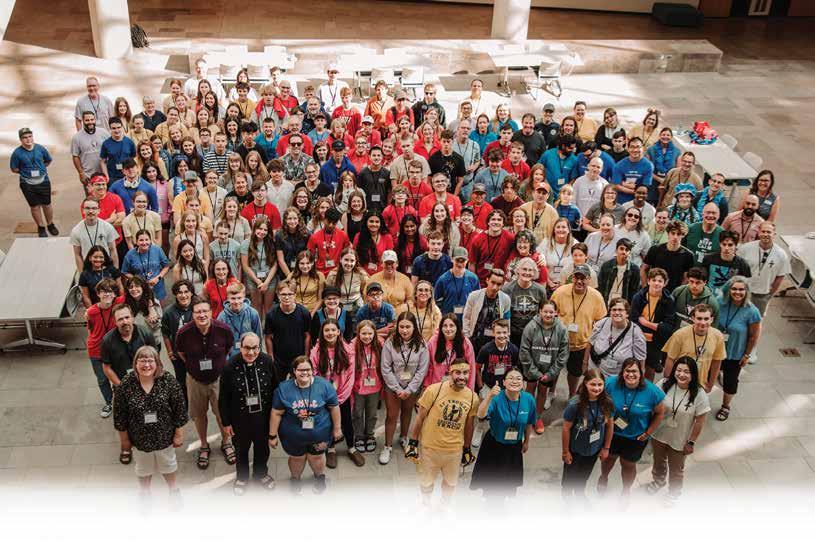
“
Very Positive & Very Genuinely Lutheran
REFLECTIONS ON LCC’S 2025 NATIONAL YOUTH GATHERING
BY ALEX KLAGES
Ihad the privilege and opportunity to take part in Lutheran Church–Canada’s (LCC) 2025 National Youth Gathering
“Unbreakable,” held at Wilfred Laurier University in Waterloo, Ontario. As a father to three of the youth participating and a 7+1 leader for our Trinity youth group— as well as being a pastor in LCC—I appreciated being there and seeing first-hand how things went.
What I was excited to see was how the youth from across the country, with varying communities and backgrounds, came together and enjoyed getting to meet each other. I saw my own youth getting out of the mindset that they are kind of on their own as Lutherans. The area of Manitoba where we live is very heavily Mennonite in background and practice, and they often feel alone as Lutherans. I was delighted that they made new connections with youth from all over the country. My kids are eagerly planning a trip west because of friendships forged with kids from out there, and we connected positively with another youth group here in
Manitoba and have hopes to get together with them some time as well.
There were a few dimensions to the event: worship, large group sessions, Bible studies, small group sessions, activities, a servant event morning sponsored by the Lutheran Laymen’s League of Canada, and a group outing to Bingemans Park. The worship services were from Lutheran Service Book, using various orders of prayer from there as well as Divine Service Setting Four for the Sunday main service. While some of the songs in worship were less familiar to our group, there were also some familiar hymns which were sung with great gusto by the gathered group. Rev. Paul Roggow’s sermons were brief and to the point as he preached on the theme passage, Ephesians 6:11-18.
The large group sessions were mainly and ably led by LCC Past President Robert Bugbee and Jennifer Kerr. In these sessions we explored in a largely anecdotal way the meaning of the various parts of the armour of God described in
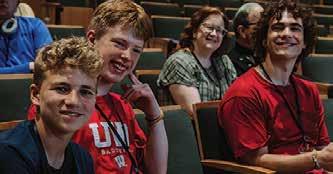
Ephesians 6. My youth were very excited every time Pastor Bugbee taught, and learned a great deal from him, and also connected really well with Jennifer’s teaching sessions.
The Bible studies were set up to reinforce the points made in the main sessions. The adult leaders group I participated in had Rev. Roggow as our study leader. The youth were divided into study groups by age and sex, with a combination of pastors and well-trained lay leaders teaching them from a provided study outline. Our youth genuinely enjoyed digging into God’s Word and getting to know other youth through these times of in-depth study.
The small group sessions for the youth leaders were the ones I attended; and I found them helpful both as a youth leader and as a pastor for understanding some of the struggles and issues our youth grapple with today, many of which are exacerbated by the digital devices we have all become accustomed to carrying. There was definitely deep food for thought! The youth in my group attended various of the small group sessions and found them interesting, intriguing, and helpful in different ways.
Activities my group took part in included several highenergy games like ultimate frisbee out on the soccer pitch across from the dorms, and dodgeball in the gym. There were also lower-energy activities like trivia contests, board gaming, chalk sketching, colouring, beading, and other creative pursuits. As a youth leader, there were good support sessions for the leaders in the evenings and clear directions on how to do things—something greatly appreciated for my first time out!
The food at the Wilfred Laurier food service was ample and greatly enjoyed. Our group was especially excited to find the milk and chocolate milk dispenser after a couple days of drinking a lot of pop and juice and water. I heard no complaints about the menu from my group!
Monday of the NYG was mostly off-site. In the morning, we headed out to various servant events. I personally helped with bundling packages for Lutheran Association of Missionaries and Pilots (LAMP), and learned a little more about the work of LAMP in bringing the good news of Jesus to remote communities in Canada’s north. We worked out of the basement of Holy Cross in Kitchener, and got a nice tour of the church as part of our time there. Other activities youth in our group did included assisting with Lutheran Bible Translators of Canada, at Creation Ministries, and at a couple different seniors’ homes in the Kitchener-Waterloo community.
Monday afternoon at Bingemans Park was a lot of fun. The Lutheran Laymen’s League of Canada provided


participants with an amazing bagged lunch and great reusable lunch bags. After lunch, the kids at the water park enjoyed the slides and such while the minigolf and bowling group had fun playing a rather tricky minigolf course and then bowling as much as we could before time ran out.
Throughout the event, Rev. Peter Knelsen was an able emcee, introducing events and people well. Rev. Glenn Worcester set up a squad contest idea which also helped keep the various groups engaged and interacting with each other (even though our red group, Petra, lost!).
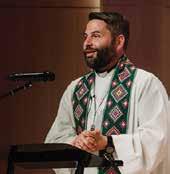
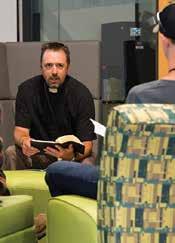

It was a very positive, and very genuinely Lutheran, youth event. It was a great joy for the youth from my family and congregation who attended, and I can imagine some of them will want to attend and/or serve as ‘minions’ at the next gathering in three years’ time. A big thank-you to LCC’s National Youth Gathering committee for their work in organizing this year’s event!
REV. ALEX KLAGES is pastor of Trinity Evangelical Lutheran Church in Winkler and Zion Evangelical Lutheran Church in Morden, Manitoba.
Photos: Robynn Fraser (group, top row); Thomas Winger (rows 2–3)
Getting to know LCC’s new Associate Director – Family Ministries
Who is LCC’s new Associate Director – Family Ministries?
My name is Samantha Neeb. I grew up on a farm between Kitchener and Stratford, Ontario, in a house with six daughters; I’m the fourth.
I have been fortunate in that not only have I gotten to explore a lot of Canada, but I have also lived in three different provinces (Ontario, British Columbia and Alberta) before adding a fourth with my move to Winnipeg, Manitoba.
I enjoy reading, traveling, playing board games, and finding the best ice cream around.
What path led you to serving the Church as a Director of Parish Services?
The long story is that my formation for this vocation started long before I realized it. I was baptized and confirmed at First St. Paul’s Lutheran Church in Wellesley, Ontario, and have spent my life in the church.
I am blessed with parents (and extended family) that were active in the church while I was growing up and still are today. My father continues to serve as an elder and my mother continues to serve as the Sunday School and Vacation Bible School superintendent. With these and other examples, it was natural for me to begin serving in the church at an early age.
At this early age I thought about serving in the church full-time as a vocation but did not know what options were available to me. Years later I met a Director of Parish Services intern that was serving in the same circuit I was in, and I saw a possible avenue for me. At the time, though, the program was no longer offered, so it was not something I could pursue.
A few years later, I saw a job posting in the InfoDigest newsletter for a Youth Director shared between two congregations in the Vancouver area. After being selected for the position and starting, that desire for training for the role I was working in came again and the program was now available through Concordia Lutheran Seminary in Edmonton.
In 2021, I began my educational formation with CLS while continuing to work as a Youth Director. During the 2023-24 school year, I moved to Edmonton to complete my class work, and in the 2024-25 school year I completed my internship. The internship was the final major component of the Graduate Diploma in Parish Services program, which led me to graduation and a first call in May 2025.

Why was the new Associate Director – Family Ministries position created?
This position was created in response to Resolution 22.3.03, which was passed at the 2022 Synod Convention. The overture was submitted by the West Region RMMC.
What is a Director of Parish Services, and how does this fit into the diaconate in Lutheran Church–Canada?
In Lutheran Church–Canada, there are two major categories in the diaconate: Lutheran teachers, who have been trained and certified to teach in Lutheran schools, and those who serve in congregations, most often known as Directors of Parish Services.
A Director of Parish Services serves alongside a pastor, most often in a congregation. Deacons do not preach or administer the sacraments, but assist in many other ways, including with Sunday School, youth, VBS, music, visitation, Bible Study, and more.
I have been told by one of the members who worked on the overture that the desire for this role was prompted by a few different things, including a strongly voiced desire to see a position like this coming from the leaders who participated in the 2019 National Youth Gathering youth leaders’ round table, and the loss of the ABC District Office’s Parish and School Services department, which left a void where there had formerly been support for youth and children’s ministry.
What is “Family Ministries,” and how does it support the Office of the Holy Ministry and the life of the Church?
cont’d on next page
“Family Ministries” as suggested by this position title, encompasses family, children, youth, and young adult ministries within the church. Just as the office of deacon was established for the well-being of the Church and for providing assistance to the Office of the Holy Ministry and to congregations, so was this position.
This position was created to help and support those in the Office of the Holy Ministry and those in other helping roles, focusing on the families, children, youth, and young adults in our church, outside of the Sunday morning service.
Some of the key areas laid out in this position are equipping, connecting, supporting, collaborating, training, and developing resources. All of these areas help support the ministry of the Word amongst the younger generations of the church.
What experience and gifts do you bring that will be especially helpful in this role?
I have been fortunate to volunteer and work in many different areas of
NATIONAL NEWS
family ministry, including Sunday School, VBS, a children’s evening program, children’s messages, pre-teen group, youth Bible study, youth group, Confirmation classes, youth and young adult retreats and gatherings, as well as one-day and multi-week family and congregational events.
Serving in these ways has allowed me to experience a wide range of family ministry opportunities, as well as get to know various resources that I could share with anyone needing something new.
I have also been fortunate to have lived in both the East and West regions, which has allowed me to develop relationships with a number of church workers and volunteers across the synod, which will help to build connections and create a network of those serving in or focusing on family ministries.
What specific goals or areas of focus do you hope to work on in your first few years?
Since this is a new position, I am still learning about all that it
encompasses and understanding how it is accomplished. In order to do that, I need to gain a better understanding of what family ministry looks like across the synod and what the needs are.
To do that, I will be dedicating some time to information gathering. This information gathering might include attending the regional pastors’ and deacons’ conferences, visiting congregations or circuits, and giving presentations or having roundtabletype discussions; joining in a week of VBS, a youth night, or a retreat; and having conversations over the phone, video, or in-person to learn more.
After a period of information gathering and once the needs have been identified, I look forward to working with the members of synod to fill those needs. In the meantime, I look forward to working with the National Youth Gathering committee and supporting church workers, volunteers, and congregations across the synod.
If you would like to connect and be part of the information gathering, please do not hesitate to reach out to me at sneeb@lutheranchurch.ca.
Reflections from our 2025 Summer Internship

CANADA – Lutheran Church–Canada (LCC) and Lutheran Laymen’s League of Canada (LLL-C) teamed up to offer a paid, part-time internship opportunity this past summer. This year’s selected interns came from across Canada, bringing with them a diverse range of experiences and talents.
Internship supervisors Lisa Jackson (Managing Director, LLL-C) and Alex Steinke (Director of Communications, LCC) are grateful to the interns for their dedication and flexibility this summer as they tackled a variety of projects.
Full reflections by our interns on CanadianLutheran.ca.

Assistant Regional Pastor Position Approved for West Region
WEST REGION – The Board of Directors recently approved a pilot approach for the creation of an Assistant Regional Pastor (ARP) position for the West Region. This will take effect following the election of the Regional Pastor at the June 2026 Synod Convention.
The West Region covers LCC’s largest geographical area and has the greatest number of congregations of all three regions. Combined with significant pastoral and administrative demands, the workload is more than one person
can effectively manage. Under the direction of the Regional Pastor, this new position will help ensure workload sustainability, increase pastoral presence, and strengthen support for congregations and pastors. Pending a positive review, the ARP position may also be expanded to other regions.
How it will work
• The West Regional Pastor will nominate a candidate for the ARP role.
• The President’s Ministry Council (PMC)—which consists of the
President, Vice-President, and the three Regional Pastors— will review the nomination and recommend a candidate to the Board of Directors.
• The Board will give final approval and issue the call.
The ARP position will be a four-year term, with annual reviews to assess feasibility, financial availability, and ongoing need. It will be a part-time role, compensated at approximately 50 percent of the Regional Pastor’s salary, plus travel expenses.
LCMS Re:Vitality resource available to LCC congregations
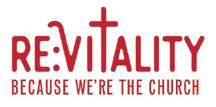
CANADA – Lutheran Church–Canada (LCC)’s President’s Ministry Council (PMC) has reviewed and endorsed the use of The Lutheran Church—Missouri Synod (LCMS)’s church revitalization resource known as re:Vitality
“There is vitality wherever God’s Word is proclaimed in purity and the Lord’s Sacraments are rightly administered,” notes the LCMS website. “This Christ-centered vitality is the focus of re:Vitality, a suite of resources developed by the Office of
National Mission to help you equip your congregation for carrying out God’s mission in your context.”
Developed by Rev. Dr. Mark A. Wood, LCMS Director of Witness and Outreach, re:Vitality begins with a free, self-administered congregational assessment tool. Congregation members complete a survey and receive an assessment of where the congregation is at in its organizational life-cycle. This assessment is based on a theory of organizational health (kingdom of the left-hand) and can be a useful way to diagnose challenges in our life together.
The process may be done independently, though having a guide who understands it is helpful in leading congregations through the results and
next steps. To support this, the PMC is training leaders to assist congregations in understanding and making use of the results of the re:Vitality tool.
Following the assessment, congregations may explore the various workshops designed to address identified needs—whether that be serving inactive members, strategic planning, or outreach.
In order to use the assessment tool, contact the LCMS Department of Witness and Outreach at WOR@lcms. org. More information is available at lcms.org/church-revitalization.
As a companion to this process, plans are in place for the PMC to develop a spiritual assessment tool for congregations to help identify spiritual health, needs, and areas for growth.
September updates live on Strategic Initiatives Tracker
ONLINE – Launched in June, Lutheran Church–Canada (LCC)’s Strategic Initiatives Tracker is an online tool designed to share ongoing progress toward the six core goals identified in our synod’s Purpose & Priorities Planning Process. September updates are now live, with progress shared where applicable across the six key areas.
Explore the latest updates online!

WEST REGION NEWS
REDUNDANT–PART 2
FROM THE REGIONAL PASTOR | REV. ROBERT MOHNS
In my last article, I noted that the word redundant comes to us from the Latin word redundare, which carries the sense of surging upward.
This summer we have had tsunami alerts on our West Coast because of earthquakes on the Russian peninsula. You may have seen videos in the past of tsunamis, where strong seismic forces push water with ever greater intensity, one wave upon another, overflowing land masses. It is one of the most powerful and destructive forces on earth. On the morning of March 28,1964, the Alberni valley on Vancouver Island was hit by six such waves, known as a wave train, and 131 people perished.
Few of us have directly experienced the force of a tsunami, but many of us have been impacted by destructive forces, tsunami wave trains of evil and sin crashing upon our lives. From my own experience, the tsunami waves of sin and evil never come one at a time, but several at a time, mercilessly destroying my feeble flesh and spirit. Foolish man that I am to think that I am invincible, resilient, and well-prepared to take on such forces and not only survive but thrive.
In my last article, I focused on the redundancy of God’s Word, by which the Lord keeps us firmly rooted in Christ. In this article I want to raise up the redundancy of the Sacraments that God has provided for His people and by which Jesus gives us His saving works.
God has given us Holy Baptism by which, through water and His Word, He adopts us as His children, drowning our sinful nature in that baptismal flood and raising us to live
in true holiness and righteousness. And talk about redundancy: every day we die to sin and rise again to live in the newness of that baptismal life.
God has given His Church the blessed Sacrament of our Lord’s body and blood for the forgiveness of sins and strengthening of faith. Week after week, Christ’s broken body and shed blood is poured into us, cleansing us from all unrighteousness and strengthening the new creation bestowed upon us in holy baptism.
Wave after wave of Christ’s redemptive works floods us, destroying sin and every evil that seeks to destroy us. The waves of God’s grace and mercy are far stronger, far deeper, and higher and wider than any one of life’s train wrecks that beset us.
God reminds us in His Holy Word that He has us and that He acts to save us. To Peter, overcome by the storm-tossed seas, Jesus immediately says: “O you of little faith, why did you doubt?” (Matthew 14:31). And to the disciples making no progress amid storm-tossed seas, Jesus comes and gets right into their boat. Matthew reveals that Jesus had intended to walk past them, but instead He jumps into their boat and calms the storms, turning to them and saying: “Take heart; it is I. Do not be afraid” (Mark 6:50).
The world sees the Church, the Word of God, and the works of Jesus as redundant, obsolete, and worthless. And even within the church, there is the temptation to consider some things redundant in an analogous way. A person might think, “Well, I have my Bible, which is all I need. Holy Baptism, the Divine Service, and

Holy Communion are all redundant, in the sense of not being necessary.”
Today the clarion call to the church is to repentance, as Martin Luther reminds us. Hammered onto the wooden doors of the church in Wittenberg were these words: “When our Lord and Master, Jesus Christ, said, ‘Repent’ (Matthew 4:17), He willed the entire life of believers to be one of repentance.”
Such repentance is a work of God which changes us, the Holy Spirit creating faith in us in God’s Word and in the work of His Son Jesus Christ, to save us—to save me—a lost and condemned creature.
God has instituted the Office of Holy Ministry to administer His holy Sacraments and to proclaim His Word of Law that convicts the heart of sin and proclaims His Word of Gospel, Holy absolution that releases the Christian from the bonds of sin and death and evil by the work of Jesus. Every day God is at work to fill our lives to overflowing with His life, real life, eternal life.
God has provided us with a redundancy of His means of grace, a continuous upsurging of His powerful Word and blessed Sacraments, waves which put to an end our greatest enemies: sin, death, and the devil. His waves of grace and mercy sustain His dearly betrothed, in order to present His Holy Church to Himself as His beautiful bride, without blemish or stain. May the voices of God’s saints redound in doxology from heaven above to every corner on earth below.
Praise God from whom all blessings flow.
WEST REGION NEWS
Installation at Grace Lutheran Drumheller
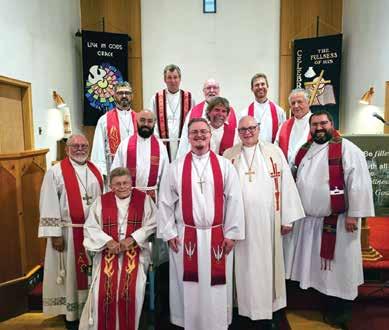
Sports camp VBS
DRUMHELLER, Alta. – Members of Grace Lutheran Church rejoiced on August 8, 2025, at the installation of their new pastor, Rev. Martin Jagnow, at a powerful and moving service. Rev. Jagnow and his wife Isabel originally hail from Brazil, but have been in Canada for a number of years. Rev. Jagnow completed seminary at Concordia Lutheran Seminary in Edmonton, graduating in May; this is his first placement.
Clergy from the Calgary circuit as well as other pastors from various congregations came to show their support to Rev. Jagnow, including his father-in-law, Rev. Paulo Brum of Regina, and West Regional Pastor Robert Mohns. Rev. Dr. Alex Vieira from Concordia Lutheran Seminary preached on 2 Corinthians 4:7. The pastors, guests, and congregation enjoyed a dessert fellowship following the service.
Lynn Hemming

DRUMHELLER, Alta. – Beginning August 18, 2025, Grace Lutheran Church in Drumheller held a weeklong sports camp/Vacation Bible School, with 27 local kids attending. Seven youth and two youth leaders from Bethel Lutheran Church in Sherwood Park came to Drumheller to help facilitate the week, bringing with them not only sports equipment but also valuable
experience in running sports camps alongside VBS.
Ten youth and several adults from the congregation in Drumheller worked with the Bethel youth to provide an action-packed and spiritually enlightening week of activities for the children who attended. The kids participated in a variety of sports such as basketball, football, volleyball, and floor hockey,
and then spent the other half of the day learning about God’s love for them in Jesus.
Several children in attendance were introduced to the Gospel for the first time. It was also gratifying to see the growing leadership skills of the youth who led the activities, and the friendships being formed between the youth in both congregations.
Lynn Hemming
WEST REGION NEWS
St. John’s celebrates 100th anniversary
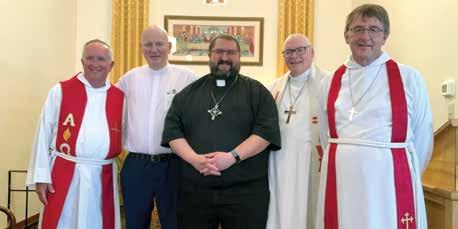
MAGRATH, Alta. – On July 27, a special centennial celebration service and fellowship social was held at St. John’s. It was a joyous celebration with local members, former members from afar, and participants from the community attending. Many pastors participated in the service, including Revs. Richard Williams, Fred Hertwig, Brian Amison, Richard
Brown, Wendel Ritz, and West Regional Pastor Robert Mohns. Following this special service, a delicious lunch was enjoyed in the hall by approximately 95 guests.
St. John’s was formalized as a congregation in 1925, but the first Lutheran services began in 1908 with a pastor from Pincher Creek. Early services were held in private
Canada Day Barn Dance
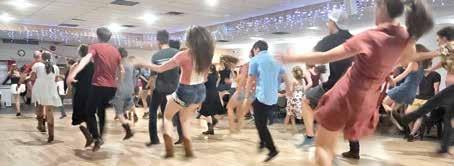
SPRUCE VIEW, Alta. – On July 1, 2025, King of Kings Lutheran Church
hosted their 9th annual Canada Day Barn Dance, with about 150 people
homes. As the congregation grew, services were provided by pastors from Lethbridge. These services were held in the local Presbyterian Church, the Assembly Hall, and the Town Hall.
Shortly after World War II, the congregation decided to build a church. The first service in the new building was held on July 18, 1948. The congregation continues to hold services in this building today. A hall was added onto the church in 1991.
St. John’s has always shared pastors with other parishes: initially with Pincher Creek, then with Lethbridge, and presently with Milk River.
St. John’s praises God for blessing them over these more than 100 years with caring and compassionate pastors who have shared God’s true Word and faithfully administered the Sacraments. Lila Mosser
of all ages in attendance. There was a live band and called dances, so even non-dancers could hit the dance floor. Guests could also enjoy complimentary popcorn and water. The church also partnered with the Dickson Store Museum, who brought a cooler of ice cream for those who wanted to buy a sweet treat.
The congregation thanks the Lord for our country, and for the wonderful evening shared with neighbours and friends. Lona Fawcett
CENTRAL REGION NEWS
Cypress Parish marks five years with Pastor Heide
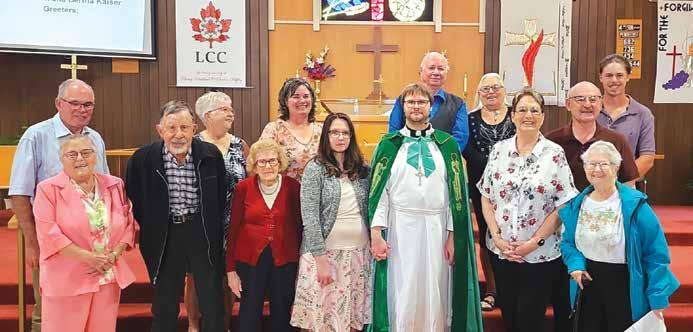
SOUTHLAND CIRCUIT – On July 6, Cypress Lutheran Parish celebrated five years of service in the ministry by Rev. Travis Heide. Members from the dual parish participated in the Divine Service followed by a barbecue potluck lunch.
Rev. Heide was called to serve the dual Saskatchewan parish, consisting of Mt. Calvary Evangelical Lutheran Church (Swift Current) and Trinity Lutheran Church (Ponteix) upon his Sacred Convocation from Concordia Lutheran Seminary in Edmonton. He was installed on July 19, 2020, and consecrated the Lord’s Supper for the first time, while Central Regional Pastor David Haberstock preached the sermon.
Trinity
While public safety measures due to COVID-19 adversely impacted worship attendance, and many stalwart members of both Mt. Calvary and Trinity have passed on to glory, the Cypress Parish has taken many great strides over the past five years. Immediately in the fall of 2020, Rev. Heide conducted Confirmation classes for the youth. Holy Communion has been celebrated every Divine Service thanks to a dedicated team of lay leaders. Adult catechesis, Bible studies, and hymn studies have provided opportunities for growth in understanding the Lutheran Confessions and for expanding the parish’s liturgical and musical
repertoire. Beginning in the spring of 2023, monthly potlucks following Divine Service were reintroduced. Rev. Heide preached a sermon on the Gospel lesson from Luke 10:16: “He who hears you hears Me, and he who rejects you rejects Me, and the one who rejects Me rejects the One who sent Me.” “But isn’t this a blessing,” the pastor reminded both himself and the congregation, “to know that it is not all about you?” Service concluded with the singing of the missional hymn “O God of Light,” looking forward to the church’s glorious future and more years of ministry. Rev. Travis Heide
Lutheran Church dedicates new paraments

PONTEIX, Sask. - Trinity Lutheran Church, a member of the two-point Cypress Parish, held a special dedication for its newly acquired paraments on August 2, 2025. A complete set of paraments in liturgical colours were donated by Resurrection Lutheran Church in Saskatoon. Rev. Travis Heide presided over the Rite of Blessing, and the congregation thanks the board at Resurrection for their donation. The paraments decorate the altar and ambo at First United Church in Ponteix, whose building Trinity Lutheran Church rents for weekly worship. Rev. Travis Heide
CENTRAL REGION NEWS
BACK TO SCHOOL, BACK TO PRAYER
FROM THE REGIONAL PASTOR | REV. DAVID HABERSTOCK
As I write this, summer is over and the annual round of programs are beginning again in church, school, and society. With the return to school comes a return to regular life, patterns, and habits. And with that return, be sure to renew your prayers! Especially for the world around you.
Martin Luther, teaching on John 14:12, said: “But we, as Christians, must know that the whole system of earthly government stands and remains for its allotted time solely through God’s order or command and the prayers of Christians.” This is a profound truth. All good order which Satan, the world, and our sinful nature would gladly overthrow only continues because first, God has ordered things in a certain way, and second, because Christians pray.
God’s order in the world is His design for the world and for human society. Structures such as marriage, the family, parental authority (and, by extension, schools and government), no matter how they are attacked and fall apart, will always reestablish themselves because they are the very fabric of reality. They are the natural law which is embedded in the universe and written on the hearts of mankind in our consciences.
God’s commands have ordered things a certain way. Tyranny—a perverting of that order—only lasts so long before things fall apart and order manifests itself again. Human sin always seeks to twist God’s order for its own purposes, but the good design of God always reasserts itself because it is established in the laws of the universe. You might as well fight
against gravity as fight against God’s order for creation and human society.
And yet, despite this command of God which orders our universe, it does not stop sinful humans and the “world”—of which Satan is the prince (John 14:30)—from perverting this order for their own purposes. This is why your prayers—collectively as the Church in Divine Service and individually as a Christian—are so important. God upholds all things, including His own order, for the sake of His saints.
When we Christians pray, God listens, answers, and preserves the world for our sake. Our Lord commands us to pray “Thy kingdom come,” by which we are asking that the Lord “breaks and hinders every evil plan and purpose of the devil, the world, and our sinful nature” (Small Catechism, Explanation to the Third Petition).
As evidence of this, Luther cites numerous biblical examples of unbelieving households (Laban due to Jacob) and pagan nations which prospered because of the prayers of the believers within them (such as Abraham and Lot, Joseph, Daniel, even Naaman, and so on). However, when a government begins to persecute the Christians who would pray for that nation, when such prayers are silenced or driven out, then comes the downfall of such nations, no matter how powerful they have been.
Everything that the world has Jesus grants because of His Christians in it. As aliens and strangers in this world, we are “as having nothing, yet possessing everything” (2 Corinthians 6:10). All that is within the world is the Lord’s
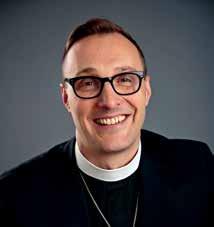
(Psalm 50:10), even though the world does not believe such things but instead trusts in themselves and in their own might. The world even tramples on Christians, not recognizing that we who trust in Him uphold the world through our prayers. And this is told to us for our instruction and consolation. For the Lord wants to work through us greater things in this world than He Himself accomplished (John 14:12). Because we are baptized in His name and have His Word and Sacraments by which He imparts His salvation, He is calling, and has called, more people to faith through His Christians than He Himself did during His earthly life. Thus, the world is preserved for our sake. For He loves us and saved us in Jesus, and has left us here to do His work. Through Him, your prayers and witness are powerful.
So as the kids go back to school: pray. Pray for the salvation of your children and grandchildren. Pray for their nurture in life-giving knowledge and skills. Pray that they remain in their baptismal faith. Pray, if they have not been baptized, that the Lord would bring it to pass. Pray, if they have departed from that faith, that the Lord would “follow them all the days of [their] life” (Psalm 23:6), until the Holy Spirit pounces on them, bringing them back to the faith of their baptism. Pray that our government would turn to the Lord so that they might govern with the wisdom that comes from above. Pray for your congregation and church, that the light of the Gospel would shine through your congregation increasing your faithfulness and bringing new lambs into Christ’s sheepfold. Pray. For the Lord listens and responds.
Rev. Repo celebrates 50th ordination anniversary
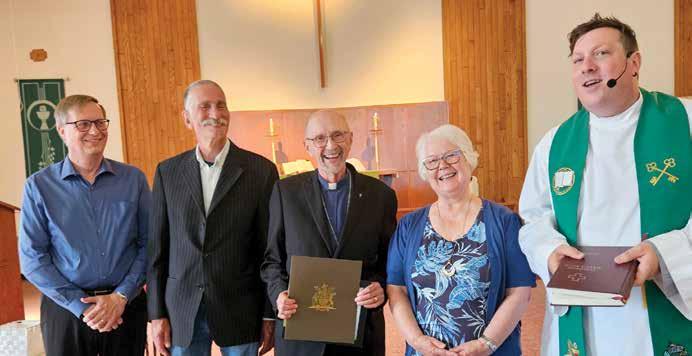
THUNDER BAY, Ont. – On Sunday, August 31, Christ Evangelical Lutheran Church celebrated the 50 th anniversary of Rev. Daniel Repo’s ordination.
Rev. Repo is a former pastor at Christ Evangelical Lutheran, having served in that capacity for 14 years from 1998-2012. Prior to that, he served as pastor at St. Paul Lutheran in Dawson Creek from 1974-1979, and at Faith Lutheran in Atikokan for 18 years from 1980-1998. He has been an active supporter of the social ministry at Lutheran Community Care, as well as Camp Aurora Bible Camp.
Rev. Repo also served as Circuit Counsellor for many years and
helped out with services when there were local vacancies at Epiphany and Christ. As a current member, he continues to serve as an elder for the congregation and, although retired, serves in many other capacities in the church.
Pictured in the photo are Michael Maunula (president of church council), Dominic Pasqualino (acting mayor of Thunder Bay), Rev. Dan Repo and his wife Lorraine Repo, and Rev. Peter Noble (pastor of Christ Evangelical Lutheran Church).
The congregation is truly blessed to share in this servant’s journey of faith. After presentations recognizing Rev. Repo’s many years
of ministry, coffee and cake were served in the Fellowship Hall.
Christ Lutheran Church
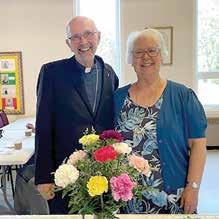
EAST REGION NEWS
LIVING AS ONE BODY
FROM THE REGIONAL PASTOR | REV. MARVIN BUBLITZ
Times are changing in the life of many congregations. It seems like only yesterday that our pews were full and we had more than enough people to serve in offices. A vacancy was only for a short time, as the number of pastors available was plenty. Not only did our pews have an abundance but our chequing accounts had surplus.
Yes, times were good back then. But now… now we struggle. Church buildings that can seat hundreds barely fill a few pews. Council positions sit vacant. Volunteers are in short supply. And pastors are in even shorter supply. It is difficult to get pulpit supply. Congregations may sit vacant for two to three years or more.
Yet, it is not the same everywhere. Some congregations seem to be doing well even in these difficult days. So, with some congregations doing well and others struggling, what is a people to do?
We should do what the people of God should always do: repent of our sin; return to the Lord in His Word and Sacraments; rejoice in His blessings; work together as His people.
For the body does not consist of one member but of many. If the foot should say, “Because I am not a hand, I do not belong to the body,” that would not make it any less a part of the body. And if the ear should say, “Because I am not an eye, I do not belong to the body,” that would not make it any less a part of the body. If the whole body were an eye, where would be the sense of hearing? If the whole body were an ear, where would be the sense of smell? But as it is, God arranged the members in the body, each one of them, as He chose. If all were a single member,
where would the body be? As it is, there are many parts, yet one body.
The eye cannot say to the hand, “I have no need of you,” nor again the head to the feet, “I have no need of you.” On the contrary, the parts of the body that seem to be weaker are indispensable, and on those parts of the body that we think less honourable we bestow the greater honour, and our unpresentable parts are treated with greater modesty, which our more presentable parts do not require. But God has so composed the body, giving greater honor to the part that lacked it, that there may be no division in the body, but that the members may have the same care for one another. If one member suffers, all suffer together; if one member is honored, all rejoice together.
Now you are the body of Christ and individually members of it.
– 1 Corinthians 12:14-27
As the body of Christ, we work together, and those with plenty share with those in need. That can sound all nice and fine in a sermon, a Bible study, or an article. What about where the rubber meets the road? What about in day-to-day practice in His Church? How does the Body of Christ operate in these days? Well, people can either operate with the Old Adam in the driver’s seat or the with the heart of the New Man in Christ.
If the Old Adam is in control, people do what is best for themselves, and congregations do what is best for themselves. Thoughts like “be warm and well fed” (James 2:6) are spoken, but nothing is done to help. Each congregation strives to be autonomous. They do what is best for themselves and ignore the others. The thought of working together, joining

together, or sharing a pastor is foreign. Rather, in the spirit of the pharisee, they say, “I thank God we are not like those other congregations.” Such thoughts, talk, and actions are not befitting the people of God for whom Christ shed His holy blood.
The New Man in Christ recognizes it is the Lord’s Church. It is Jesus who died for her. He is in control. So, the New Man in Christ, washed in His Baptism, forgiven in His blood, and feed at His table, strives to care for the whole body in their need.
“So then, as we have opportunity, let us do good to everyone, and especially to those who are of the household of faith” (Galatians 6:10). When the rubber meets the road, we work together. In practice, it means every congregation needs to ask how we can work with the other parts of the Body of Christ in this area and across Synod. It means each congregation being willing to sacrifice for the good of the whole.
I implore each of you to honestly consider how working together in ministry might benefit the area in which the Lord has placed you in His Church. The parts of the Body of Christ are not autonomous from each other. Rather, “God arranged the members in the body, each one of them, as He chose… God has so composed the body, giving greater honour to the part that lacked it, that there may be no division in the body, but that the members may have the same care for one another. If one member suffers, all suffer together; if one member is honored, all rejoice together” (1 Corinthians 12:18, 24b-26).
Almighty God grant that we live and work together as the Body of Christ, especially in these times of need. Amen.
EAST REGION NEWS
Christ Lutheran celebrates 75th anniversary
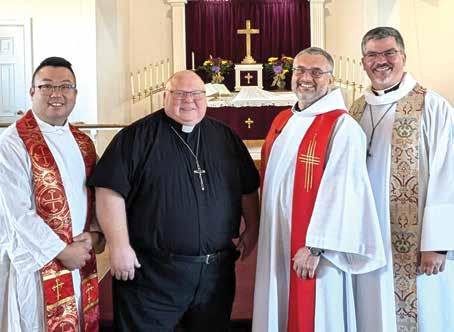
TIMMINS, Ont. – Friends, neighbours, and members gathered on July 30, 2025, to celebrate the 75th anniversary of the dedication of Christ Lutheran Church.
Rev. Michael Brondos was the first pastor assigned to Timmins in 1946. The congregation was founded on January 12, 1947. They first gathered in Central Grade School. On June 20, 1948, a groundbreaking service was held at the corner of 8th Avenue and Spruce Street for the site of the current church building. The congregation at that time built the building themselves, assisted
by Rev. Brondos, who was also a skilled carpenter. It was completed and dedicated to the glory of God on August 20, 1950.
Over the years, the vacancies between each of the pastorates were lengthy. Until 1963, these vacancies were opportunities for the congregations in Kirkland Lake and Timmins – South Porcupine to help each other. During the pastorate of Rev. Rucki (1963-1965), an arrangement was made for a dual parish ministry with St. Paul Lutheran Church in Kirkland Lake. It is interesting to note that today,
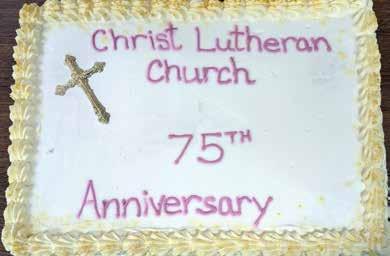
more than 70 years later, that church is now one ministry of Christ Lutheran Church, Timmins, served by vacancy pastor, Rev. David Smilek.
For this 75 th anniversary celebration two former pastors, Rev. Joel Kuhl and Rev. Milton Lam, were part of the celebratory Divine Service led by vacancy pastor Rev. David Smilek. East Regional Pastor Marvin Bublitz and his wife, Linda, were also able to attend the ceremony.
The service was followed by a catered luncheon where guests and pastors shared personal memories. Rev. Kuhl recalled many memories of his 14 years of service at Christ Lutheran. Rev. Lam also had many fond memories and milestone events happen during his life while serving in Timmins. There were also members from Kirkland Lake and Cochrane who were able to attend. Emcee JoAnn Lauay and Elder Robert Schuehlein read their own speeches as well as messages from former members who were unable to attend. Everyone took the opportunity to visit together as the cake was served.
The congregation prays that the church will continue to be present for many more years to come and continue to grow in God’s Word as it has over the past 75 years.
Monika Schuehlein
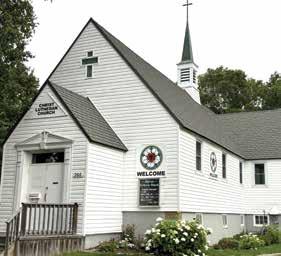
EAST REGION NEWS
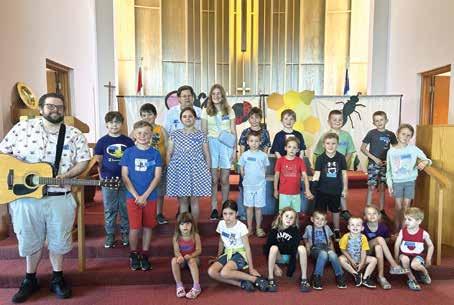
FISHERVILLE, Ont. – Even with the hot weather, the kids at Trinity Lutheran Church had three wonderful and fun-filled days at Vacation Bible Camp on July 14, 16, and 18. There were 20 kids registered to explore the theme: “Magnified: Discovering the Bigness of God in the Smallest of Things.”
Through Bible study, crafts, and games, the children discovered that, even though we are small, we are all made to praise God and to magnify His love. This year we were blessed to have a guest speaker, Kayla Falkenholt, a Grade 6 teacher for missionary children overseas. Answering lots of questions from the kids, she shared how different
life in Cameroon (Central Africa) is from life here in Fisherville.
Since Falkenholt is also with Lutheran Bible Translators of Canada, the kids enjoyed listening to the Bible translated in almost every language the children could think of. The kids seemed quite interested (and
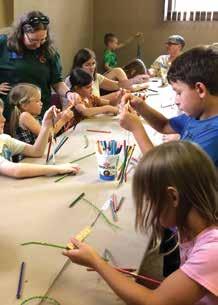
a bit surprised) about the different languages spoken, as well as to learn that some languages have not even been written down!
Organizers thank Falkenholt for visiting as well as all the volunteers at Trinity for making it a great week!
Tricia Miller

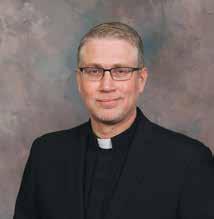
WHERE CHRIST SERVES
DIRECTOR OF INTERNATIONAL MISSIONS | REV.
M.L. SMITH
“The Son of Man came not to be served but to serve, and to give His life as a ransom for many.” – Matthew 20:28
To many, worship is often seen as something we do— our offering, our praise, our devotion. But the Divine Service is not primarily our service to God, but God’s gracious service to us. It is Divine. It is Service. And it is Christ Himself who serves. The crucified and risen Lord Jesus comes to deliver His life-giving gifts. He gives; we receive. He speaks; we listen. He forgives; we rejoice. The Divine Service then is heaven touching earth, time caught up into eternity, and redeemed sinners gathered into the fellowship of the Triune God.
CHRIST AT THE CENTER
The heart of Christian worship is not emotion or entertainment, but Christ Jesus—His Word, His promises, His gifts. The Divine Service is not a drama about God; it is an encounter with God. As the Lord vowed to come to bless His people wherever He causes His holy Name to be remembered (Exodus 20:24), so now the risen Christ comes among us, fulfilling that promise in the fullness of His presence (Matthew 18:20).
He is both the Host and the Server, the Giver and the Gift. Every part of the liturgy proclaims and delivers Him: from the Invocation to the Benediction, from the Kyrie’s cry for mercy to the Sanctus’ song of heaven, from the Word read and preached to the Body and Blood given and received. Here, Christ is truly present to cleanse,
forgive, heal, strengthen, and renew His people.
THE WORD THAT GIVES LIFE
In the Service of the Word, God speaks. Through the Scriptures and the sermon, the living voice of the Good Shepherd calls His sheep. His Word is not merely informative; it is performative and transformative. It is living and active, killing sin and raising faith. It is the sword of the Spirit and the balm of the wounded. And where that Word is proclaimed faithfully, Christ is present and at work, giving Himself and His life-giving gifts.
This is why the liturgy is rich with Scripture from beginning to end. We sing the Psalms, echo the songs of heaven, pray the prayer our Lord Himself taught us. Through these Spirit-breathed words, Christ blesses His people, sanctifies His Church, and unites our voices with the saints in every age. Worship then is not a solo act of a single congregation, but the united voice of the one holy Church—gathered across generations, languages, and lands—praising God for the gifts and blessings we receive in Christ Jesus.
THE GIFTS THAT NOURISH
In the Service of the Sacrament, Christ feeds us with His precious body and blood. The altar is not a stage; it is His throne of grace. The
Sacrament is not a symbol; it is the gift of Christ Jesus Himself. “This is my body… This is my blood… for the forgiveness of sins.” Here is the Gospel made edible. Here is love made tangible. Here the Church is gathered and nourished and made one in Christ.
The Lord’s Supper is not our offering to God; it is His offering to us. Receiving the Sacrament is the highest and most sacred act of worship—not because we give to God, but because God Incarnate gives Himself to us in the most intimate and profound way. The Lamb who was slain is now the Host who feeds His lambs, drawing them into communion with Himself and with each other.
HEAVEN ON EARTH
The Divine Service is not a break from reality; it is reality breaking into our lives. In it, the veil between heaven and earth is lifted. We join angels and archangels and all the company of heaven. We kneel at an altar that is joined to the heavenly feast, surrounded by such a great cloud of witnesses.
Whereas the world may see only a place of wood and stone. Faith sees the house of God. The eyes may see a modest assembly. Faith beholds the gathered glory of the Kingdom. The ears may hear the voice of a man. Faith hears the voice of our living and life-giving Lord. And the heart is filled with His peace.
MISSION NEWS
FORMED TO SERVE
The Benediction sends us into the world bearing Christ. Having been served by Him, we are sent to serve others. Having received mercy, He calls on us to show mercy. Having been filled with His love, He calls on us to share His love with others. The Divine Service forms and shapes us through the working of the Holy Spirit, sending us to live as the Body of Christ in the world.
And so, we return again and again—not out of mere obligation, but because this is our lifeline. In a world of weariness and sin, the Church gathers where Christ is present: to be forgiven, fed, comforted, strengthened, and equipped for service in the world.
CHRIST’S SERVICE
The Divine Service is Christ’s ongoing ministry. He, the eternal High Priest, still intercedes. He still speaks. He still serves. He still saves. As surely as He came once in humility, He comes now in Word and Sacrament. And He will come again in glory.
Until that day, we gather— not to perform, but to receive; not to impress, but to be renewed in Him. By His divine power, we are made partakers of His life, clothed in His righteousness, and filled with His Spirit. Week after week, the weary are welcomed, the broken are mended, and sinners are declared saints— not by our efforts, but by the gracious work of Christ, who still serves His people.
“His divine power has granted to us all things that pertain to life and godliness, through the knowledge of Him who called us to His own glory and excellence…” – 2 Peter 1:3
LCC unveils new International Missions Badge

CANADA – Lutheran Church–Canada (LCC) has released a new International Missions Badge, created as a companion to the original design by LCC member Harrison Avery Prozenko.
The original LCC badge— featuring Luther’s Rose set within a Canadian maple leaf—was highlighted on the cover of Missouri North: The History of Lutheran Church–Canada , initially published in 2022. The badge emphasizes our church body’s confessional roots and Canadian identity.
Building on that legacy, the new International Missions Badge has now been integrated into LCC’s mission
webpages. This section of the website includes an interactive mission map, allowing users to explore our global partnerships and the work being carried out in Central America, East Asia, and Ukraine. Each international mission page has been updated in 2025 with new content, ensuring visitors have access to the latest information about LCC’s mission efforts around the world.
Prozenko, who created both the original and companion designs, is also known for his work producing confessional Lutheran icons. More information on his artwork can be found at lutheranicons.weebly.com.

New pastor for South Sudanese Nuer Lutheran Church Fellowship
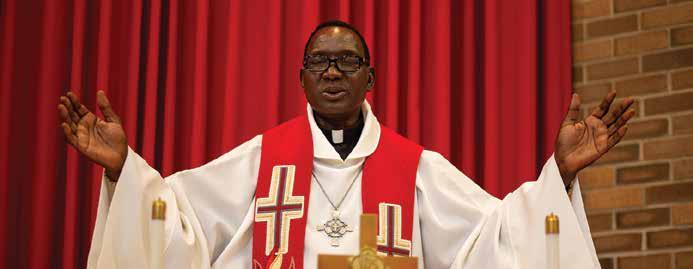
CALGARY, Alta. – Rev. Joseph Nhial was ordained and installed on September 7, 2025, at Grace Lutheran Church, where he will serve the South Sudanese Nuer Lutheran Church Fellowship.
The fellowship has been worshipping in Calgary for more than 20 years, with outreach to other South Sudanese communities in southern Alberta.
Approximately 300 people gathered for the ordination and installation service, which was followed by a festive meal.
Rev. Robert Mohns (LCC West Regional Pastor) led the ordination and installation, with Rev. Jacob Quast (LCC Director of Domestic Missions) preaching, and Rev. Peter Gatluak (Associate Pastor at Pilgrim Lutheran Church in Hamilton and
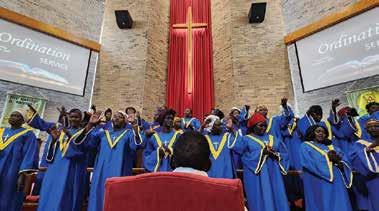
missionary to the Sudanese people) serving as liturgist.
Rev. Nhial is a recent graduate of Lutheran Church–Canada’s Pastors with Alternate Training (PAT) program, which prepares men for pastoral ministry in specialized contexts, including ethnic-language congregations across Canada.
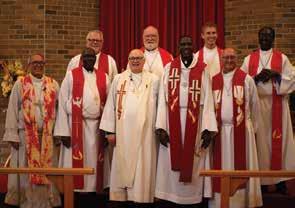
Rev. Kraemer accepts call to serve as CLS President

EDMONTON – Concordia Lutheran Seminary (CLS) has announced that Rev. Jonathan
Kraemer has accepted the call to serve as the seminary’s president.
“It is with joy that I am announcing to you my decision to accept that call,” Rev. Kraemer wrote in a letter to staff and faculty at the seminary. “As a graduate of CLS, I have always been grateful for the education I received there and am excited to be able to contribute to the formation of another generation of future pastors and deacons once again.”
Rev. Kraemer is an alumnus of CLS, having graduated in 1998. He has served Peace and Trinity Lutheran Churches in Trail and Fruitvale, B.C., and is currently serving All Saints Lutheran Church in Edmonton,
Alberta. From 2006-2016, Rev. Kraemer was a member of the faculty at CLS, serving as Assistant Professor of Exegetical Theology.
CLS shared: “We give thanks to God for His gracious leading and look forward to welcoming Rev. Kraemer into this role, confident that the Lord will bless his leadership among us for the sake of the Gospel and the formation of future pastors and deacons.”
Rev. Jonathan Kraemer will be installed as CLS President during a service at All Saints Lutheran Church in Edmonton on October 26, with a livestream option on CLS’ YouTube Channel.
Now accepting nominations for LCC seminary awards
CANADA – Each year, Lutheran Church–Canada’s two seminaries present honorary awards to those who have made a difference in the life of the seminary and the church at large. Nominations for awards at both seminaries are due in the coming months. See the details below:
CONCORDIA LUTHERAN SEMINARY (EDMONTON)
Each spring during its Sacred Convocation, Concordia Lutheran Seminary (Edmonton) presents honorary awards and degrees based on nominations from LCC members. CLS is now accepting nominations for 2025’s honorary awards and degrees which will be presented at its Sacred Convocation on May 22, 2026. Nominations close on January 1, 2026.
The recipients of these awards and degrees are selected by the faculty and Board of Regents after prayerful consideration of all nominations received. Through these honorary awards and degrees,
CLS recognizes the outstanding contributions of our clergy, deacons, and lay people.
Nominations may be made for the honorary degrees of Doctor of Laws (LL.D.), Doctor of Letters (Litt.D), and Doctor of Divinity (D.D.). In addition to these degrees, the seminary also invites nominations for the Faith in Life, Friend of the Seminary, and the Doulos Dia Iesoun awards.
The specific criteria for each award or degree and nomination forms are available from Rev. Dr. Alex Vieira. Please contact him for more information by calling 1-780-4741468 ext. 230 or by email at avieira@ concordiasem.ab.ca.
CONCORDIA LUTHERAN THEOLOGICAL SEMINARY (ST. CATHARINES, ONTARIO)
During its Sacred Convocation in May, Concordia Lutheran Theological Seminary has the opportunity to confer two major awards on worthy pastors or lay members of Lutheran Church–Canada.
The recipient of the Friend of the Seminary award is nominated by the faculty or Board of Regents for making a significant contribution to the well-being of the seminary.
The Delta Chi Medal, by contrast, is awarded by the seminary on behalf of the wider church. This “highest and most distinguished award” is “presented to an individual, either clergy or lay, whose life exemplifies service to Christ in his/her everyday living and vocation.” In nominating, one should consider the person’s service to the local congregation, the community, the synodical region, the church at large, church service organizations, and educational institutions. Delta Chi refers to the initials of the Greek expression διάκονος χριστοῦ which means “servant of Christ”.
Anyone in LCC may nominate a candidate for the Delta Chi award. No current faculty or board member is eligible. Please submit your nomination in writing to the seminary or via email to reception@concordia-seminary. ca. The deadline for nominations is December 31, 2025.
LCC seminaries hold opening services

CANADA - Under the theme Behold, I am making all things new (Revelation 21:5), Lutheran Church–Canada (LCC)’s two seminaries opened the 2025–26 academic year with special services.
CONCORDIA LUTHERAN SEMINARY (EDMONTON)
Concordia Lutheran Seminary held its service on September 2 at Bethlehem Lutheran Church. CLS is looking ahead to many new things this year, including new students, a new professor, and a new President. The service included the installation of CLS’ newest professor, Rev. Mike Kuhn.
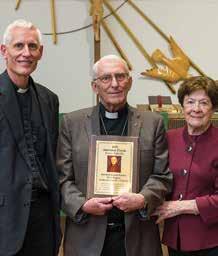
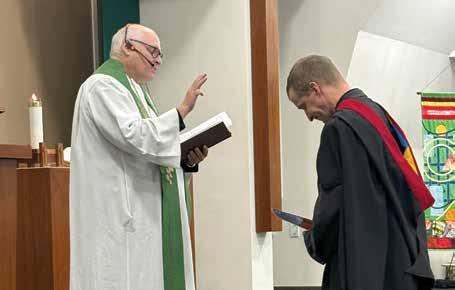
CONCORDIA LUTHERAN THEOLOGICAL SEMINARY (ST. CATHARINES, ONTARIO)
CLTS marked its 50th academic year on September 7 in the seminary chapel. “Five new students have enrolled and we’re gathered here to bless a new academic year with God’s Word and prayer,” noted President Thomas Winger.
Enrollment at CLTS has grown to 25, with students from Ghana, Australia, the United States, Sudan, and Haiti. “The seminary continues to be a focal point of theological education to the Lutheran Church around the world,” writes CLTS
in a release. “At the same time, many of these students end up serving in Lutheran Church–Canada congregations where they faithfully proclaim the Gospel.”
The service also featured the presentation of the Emeritus Crucis award to Rev. James Schuelke, a retired LCC pastor in Calgary, Alberta, nominated by the West Region. The award, given on behalf of all LCC regions, honours pastors with more than 30 years of service. Since his ordination in 1967, Rev. Schuelke has served congregations in Manitoba, Saskatchewan, and Alberta.
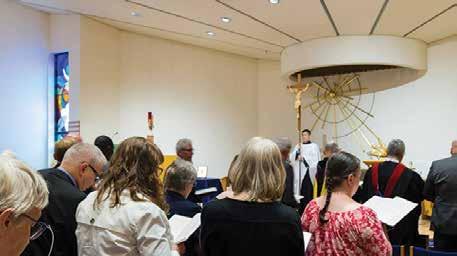
Rev. Installation of new professor, Rev. Mike Kuhn.
Sharing Jesus Christ in remote areas of Canada



The Fire of the Spirit
by Pastor Randy Heide, Director of Ministry

This summer, many teams eager to visit their friends in Northern Canada faced cancellations due to evacuations, highway closures, and heavy smoke from wild res. Despite these challenges, no one has given up. While some teams hosted Bible School for evacuees in the communities that welcomed them, others planned shorter visits for late summer or early fall.
One community that was cut o was Norway House, Manitoba. e team from Minnesota was ready to drive north through Winnipeg, almost to ompson, Manitoba. However, that road was
intermittently closed due to the Cross Lake re. e community contacts informed the team that, although they wanted to receive them, they didn’t want a day and a half’s drive to come to an abrupt stop. Respecting the community’s direction, this team postponed its summer visit. Similarly, another team from Iowa had to cancel their plans to serve in Cross Lake, as they sadly heard their friends had been evacuated and returned only to be evacuated again. When teams learned that community
LAMP Ministry Inc.
continued next page
Pastor Randy Heide and Andrew Anstey stand by LAMP's Piper Lance aircraft—a workhorse of the ministry, carrying as many quilts, layettes, and other donated goods as possible to the northern communities we serve.
e Fire of the Spirit, continued visits were impossible, they didn’t see this as an end but sought ways around it. Initiatives were taken to nd out where their friends were evacuated to and to bring Bible School to those locations. One such team from Wisconsin served in Garden Hill, Manitoba. anks to retired LAMP Missionary Gordon Gilbey, they gained access to the University of Winnipeg, where they hosted a Bible School on campus, providing families a much-needed break for a few hours. Additionally, two other teams from Winnipeg, whose Bible Schools in Cormorant and Leaf Rapids were cancelled, also found ways to support their evacuated community members close to home.
roughout these challenges, Andrew Anstey (a pilot from Mission Aviation Fellowship seconded to LAMP) and I spent the summer at our “home away from home” in ompson, Manitoba. e air quality o en required us to stay indoors with the windows closed and to plan ights using Instrument Approaches due to limited visibility at destination airports. Despite the wild res impacting summer programs in the North, the Lord is good. He continues to open doors for us to share the good news of His amazing grace and the hope of a life lived with His loving favour. Many youth and


young adults in these communities struggle with depression and suicidal thoughts due to isolation, so we pray for the re of the Holy Spirit to keep the spark of faith alive within them, giving them a sense of purpose to face each new day and hope for the life God the Father wishes them to enjoy.
We don’t always know what the future holds for the communities we walk alongside, but we do know and believe that our Lord Jesus gave His all for every soul. When invited by a community to share the love of Jesus with their children, to encourage hope in their teens, and to pray with the elders, we turn our eyes to heaven and call upon the Holy Spirit’s re to light our Lamps that we might share the Gospel light with our friends.
We are deeply grateful for all the prayers and support that upli our sta , direct our volunteers, and encourage the community faith leaders to shine the light of Christ, igniting faith and hope in all whom the Holy Spirit calls. anks be to God for the love and grace of our Lord Jesus Christ as we prepare for LAMP’s Fi y-Sixth Season.
Please continue to pray for open communities, open doors, and open hearts so that the Holy Spirit may ignite life-giving re within the hearts of our friends in the North and continue to fuel the faith of those who live and serve His Holy Word. Amen.
Thanks be to God for the generous LWML (US) grant that provided us with a new Instrument System and Auto Pilot for our beloved Piper Lance, as these upgrades made our flights this summer much more manageable and, on some days, possible.
LAMP's missionary pastor, Randy Heide, took a moment to pose for a photo with two leaders from Norway House, Pastor Gordon Johnson and his daughter, April, who serve as our community contacts.


Love that Wildfire Smoke Can’t Cloud
by Candace Maxymowich, member of St. Aiden’s
Due to the evacuation of Leaf Rapids, our LAMP team could not visit the community. Instead, they hosted a Vacation Bible School at St. Aidan’s in Winnipeg, Manitoba. Despite facing a few challenges along the way, the team members remained steadfast in their mission, pouring out the love of Jesus on the children. e accompanying poem, penned by a member of their congregation, beautifully captures this spirit and their dedicated e orts to share the gospel.
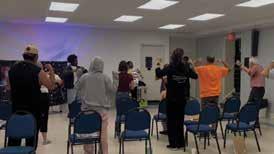

The team from St. Aidan’s had plans to serve this summer, Not being able to travel to Leaf Rapids, I’m sure, was a bummer. The wildfires came without delay, Forcing the northern community away.
The town was evacuated, skies full of smoke and flame, Over a month now in hotels, their lives aren’t the same. They came to Winnipeg with uncertainty and fear, Unsure just how long they’d be staying here.
With wildfires still burning up north in the trees, Praying for an end, we get down on our knees.
The team has shown their care in so many ways, A VBS was planned for a span of five days.
A cosmic week, a safe embrace, A holy, healing, hope-filled space. With snacks, games, crafts and prayer, To bless the children, the team prepared.
They partnered with CEF, which led Bible stories and songs, With actions of our God being mighty and strong.
To help with registration, I was given the task, But not every launch takes off on the first blast.
Sadly, Monday came with no one to greet, No kids to fill each waiting seat.
A formal complaint I thought to file, We grown-up should have played games for a while!
When Tuesday came, the bus arrived, Seeing little hearts, our hope was revived. And who was first to meet them there?
Doug, with hugs that lifted them in the air.
By Wednesday, VBS was in full flight, Rocketing through God’s love was an intergalactic delight. This day did bring quite the surprise, When police came because five kids boarded the wrong ride.
On Thursday, there was a full crew, Of kids wanting something fun to do.
When Troy was crying, I spoke gently with care, He scooted closer to me, saying he didn’t want to be there.
Friday was a day I’ll remember for years. A highlight for me was playing musical chairs.
With Janet and Greg we were down to the final three, Suddenly, I was out; with Janet’s skill, I couldn’t compete.
Performing actions to songs is enjoyable for people of all ages!.
The kids had a wonderful time discovering God’s greatness and making a fun craft based on Psalm 33:6.
Love that Wild re Smoke Can’t Cloud, continued At the end of the day, gift bags were given with love I prepared, In exchange for a payment in the currency of gummy bears. I learned this week that there’s enough love to go around, And another community like this can’t be found.
Craft helpers, “loving security,” and those who prepared food, All had a role in making this week a success, too. Their hearts and hands made it complete, A VBS that can’t be beat.
Bless the team, their hearts gave so much, Their faithful hands, their gentle touch. From snack-time grace to silly games, They served with love in Jesus’ name.
Though VBS has reached its end, Their call to serve does not suspend. For their ministry continues each day, In countless and often quiet ways.
Bless the children, though they’re far from home, May they know they are loved and not alone. They painted stars and sang out loud, Of Jesus’ love that wildfire smoke can’t cloud.
Through the bumps, the laughs, the fun, God’s love is shining on each one. In the fear and ache of all they face, May they recall God’s intergalactic grace.


We are incredibly grateful to you, our LAMP family! Your unwavering prayer support is crucial for the success and safety of our mission teams and sta missionaries as they travel. is year, we are excited to celebrate an amazing 55 years of transformative ministry. We invite you to read our fall newsletter, where you'll discover upli ing stories that highlight the impact of our mission. Visit our website at https://www.lampministry.org/#/news-devotions/ and be part of this remarkable journey with us—your involvement makes a di erence!
The St. Aiden’s team served in Jesus’ name.
Gift bags waiting to be handed to children eager to receive them.
Have you established a legacy gift for ministry? Schedule a seminar to find out how, or contact us directly.

www.lutheranfoundation.ca

TRANSITIONS
Rev. Michael Montague, Our Saviour/St. Mark (Dryden/Vermillion Bay, ON) was Called to Glory.
Rev. Vasilios Christoforidis, serving Christ Our King (Mississauga, ON) accepted a call to Mount Olive (Regina, SK).
St. Paul’s Lutheran Church (McCreary, SK) Disbanded.
Immanuel Lutheran Church (Winnipeg, MB) Disbanded.
Dcn. Katherine Enders, Candidate (Calgary, AB) was Called to Glory.
Joseph Nhial, Candidate (PAT - Calgary, AB) accepted a call to South Sudanese Nuer Lutheran Church Fellowship (Calgary, AB).
Rev. Jonathan Kraemer, serving All Saints (Edmonton, AB), accepted a call to serve as President, Concordia Lutheran Seminary (Edmonton, AB).
Rev. Vishal Paul, serving Risen Christ (Mississauga, ON) accepted a call to Risen Christ/Immanuel (Mississauga/Georgetown, ON).
ANNOUNCEMENTS
Rev. Connor Longaphie of Cornwall, ON has successfully completed the requirements of the Pastoral Colloquy Program for The Lutheran Church—Missouri Synod and has been recommended for service in Lutheran Church–Canada. In the spirit of the synodical protocol between LCC and the LCMS, LCC’s Pastoral Colloquy Committee has certified him as eligible to receive a pastoral call in LCC.
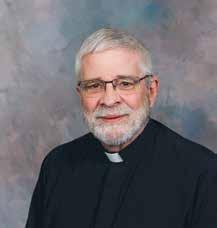
OWHAT IS YOUR DEAREST TREASURE?
SYNOD PRESIDENT | REV. DR. TIMOTHY TEUSCHER
ur synod’s ‘Together One’ campaign, which is in its initial stages, is intended to provide earthly treasures to support the preaching of God’s Word and administration of the Sacraments in all our congregations and missions, so that people now and in the future might receive the heavenly treasures of forgiveness, life, and salvation that have been won for us, as the Small Catechism puts it, “not with gold or silver, but with His holy, precious blood and with His innocent suffering and death” (SC I).
It is significant to note in this regard that our observance of the Reformation on October 31st is derived from that fall day in 1517 when Martin Luther posted his famous 95 Theses on the door of the Castle Church in Wittenberg, Germany. These, in effect, were a critique of the campaign being undertaken by the Roman Church of his day in order to, among other things, fund the rebuilding of the basilica of St. Peter’s in Rome which had fallen into disrepair.
Money for this purpose was raised through the selling of what was called ‘indulgences’—documents issued by the church for a price which supposedly shortened the time a person had to endure punishment in Purgatory in order to achieve the holiness necessary to stand in the presence of God in heaven. This teaching of Purgatory, however, is nowhere to be found in Scripture. If there was anyone who needed to undergo such purging, surely it would have been that thief on the cross who was crucified next to Jesus and who said to his partner in crime: “We are receiving the due reward for our deeds” (Luke 23:41). Turning to Jesus, he pleaded: “Remember me when You come into Your kingdom” (23:42). And how did Jesus respond? “Truly, I say to you, today you will be with Me in Paradise” (23:43).
Luther’s 95 Theses were provoked by the selling of such indulgences by the friar Johann Tetzel, whose sale pitch went along these lines: “You should know that all who confess and in penance put alms into the coffer according to the counsel of the confessor, will obtain complete remission of all their sins. Why are you then standing there? Run for the salvation of your souls!” And further: “Don’t you hear the voices of your wailing dead parents and others who say, ‘Have mercy upon me, have mercy upon me, because we are in severe punishment and pain. From this you could redeem us with a small alms and yet you do not want to do so.’” And then his
most infamous line: “Whenever a coin in the coffer rings, another soul from purgatory springs.”
Two of the 95 Theses are especially applicable to us still today. First, Thesis 1 says: “When our Lord and Master Jesus Christ said, ‘Repent’ (Matthew 4:17), He willed the entire life of believers to be one of repentance.” In his Explanation of the 95 Theses, written a year later, Luther elaborates: “It is evident that this repentance or recovery of one’s senses should involve one’s whole life, according to the passage, ‘He who hates his soul in this life, preserves it for eternal life’ (Matthew 10:39). And again, ‘He who does not take his cross and follow Me, is not worthy of Me’ (Matthew 10:38).... We pray throughout our whole life and we must pray ‘forgive us our debts’ (Matthew 6:12). Therefore, we repent throughout our whole life... for the debts for which we are commanded to pray are real and not be treated lightly; and we could not be saved unless they were remitted.” This is the reason, for instance, why at the beginning of our worship service we say these words Sunday after Sunday throughout our lives: “O almighty God, merciful Father, I, a poor, miserable sinner, confess unto You all my sins and iniquities with which I have ever offended You and justly deserved Your temporal and eternal punishment” (LSB 184).
And second, in Thesis 62 we read these words: “The true treasure of the church is the most holy Gospel of the glory and grace of God.” Again, in commenting a year later on this thesis Luther says: “The Gospel of God is something which is not very well known to a large part of the church. Therefore I must speak of it at greater length. Christ has left nothing to the world except the Gospel. Also, He has handed down to those who have been called to be His servants no such things as talents or riches, in order to show by these terms which speak of temporal treasures that the Gospel is the true treasure.... Christ speaks of the Gospel as a treasure which is hidden in a field (Matthew 13:44). And because it is hidden, it is at the same time also neglected. Moreover, according to the apostle, the Gospel is a preaching of the incarnate Son of God, given to us without any merit on our part for salvation and peace (Romans 1:3-6). It is a word of salvation, a word of grace, a word of comfort, a word of joy, a voice of the bridegroom and the bride, a good word, a word of peace.... When the sinful conscience hears this sweet message, it

comes to life again, shouts for joy, while leaping about full of confidence, and no longer fears death.... Therefore the true glory of God springs from this Gospel. At the same time we are taught that the Law is fulfilled not by our works but by the grace of God who pities us in Christ and that it shall be fulfilled not through works but through faith, not by anything we offer God, but by all we receive from Christ and partake of in Him.”
And that is our dearest and true treasure—a treasure we help share with others by and through the earthly treasures God has given us. So we sing in the hymn: “Lord, we pray that we, Your people Who Your gifts unnumbered claim, Through the sharing of Your blessings May bring glory to Your name” (LSB 782).
Concordia Lutheran Mission Society

“Jesus loves me, this I know for the Bible tells me so…”
Everything begins with the Word ! By partnering together to support Theological Training, we are strengthening the church in Nicaragua. Please assist CLMS also in the support of the Feeding Program, Lutheran Day Schools, the Music Program for Youth, and Medical Relief Aid for Church Workers

Thank you for your prayers and gifts in support of our Nicaraguan missions.
To donate, please visit our website: www.concordiamissions.org
Note: E-transfer is now available. www.facebook.com/ConcordiaLutheranMissionSociety/CLMS

INSIDE:
THE
ROAD TO CATHOLICISM AND ORTHODOXY
LUTHERANISM
Robin Dalloo reflects on how Lutheran teaching on justification drew him to join the Lutheran Church.
CHRIST’S DEATH AND RESURRECTION FOR US
We hear from Luther himself, with an article on the Gospel drawn from his House Postils.
BOUND TO SIN? LUTHER’S BONDAGE OF THE WILL
Rev. Dr. James Kellerman notes the 500th anniversary of Luther’s book TheBondageoftheWill , explaining the work’s significance for our understanding of the grace of God.
